
Initially 7, now 8 churches and multiple ministries across Polk County, TN have set to seek after the will of God for revival in their area after the pandemic. The revival has gone on now over a month each week changing to another of the original seven church locations. Over a thousand have attended in total during September alone with multiple saved, recommitted and called to the ministry in the past month. Though Fridays were set as days for prayer and reflection, on several occasions services continued well through the weekend into the next church.
Churches from the greater Conasauga, Reliance, Ocoee, Old Fort, Benton, and Delano communities along with the two oldest Polk County congregations at Cookson Creek and Friendship Baptist, are joining piece by piece the original vision God has given to many ministers for this area of East Tennessee. While a few have seen it as continuation of the Lee University student revival, most have found it as restoring the original Appalachian/Cherokee holiness outpouring, which took place among L&N Depot and Hiwassee River Rail Loop workers in the old Methodist church across from Etowah‘s chamber of commerce. As Polk Revival continues strong, the participants are requesting prayer from all who love the Lord and have awaited His renewal of the land and His people. https://polkrevival.com/
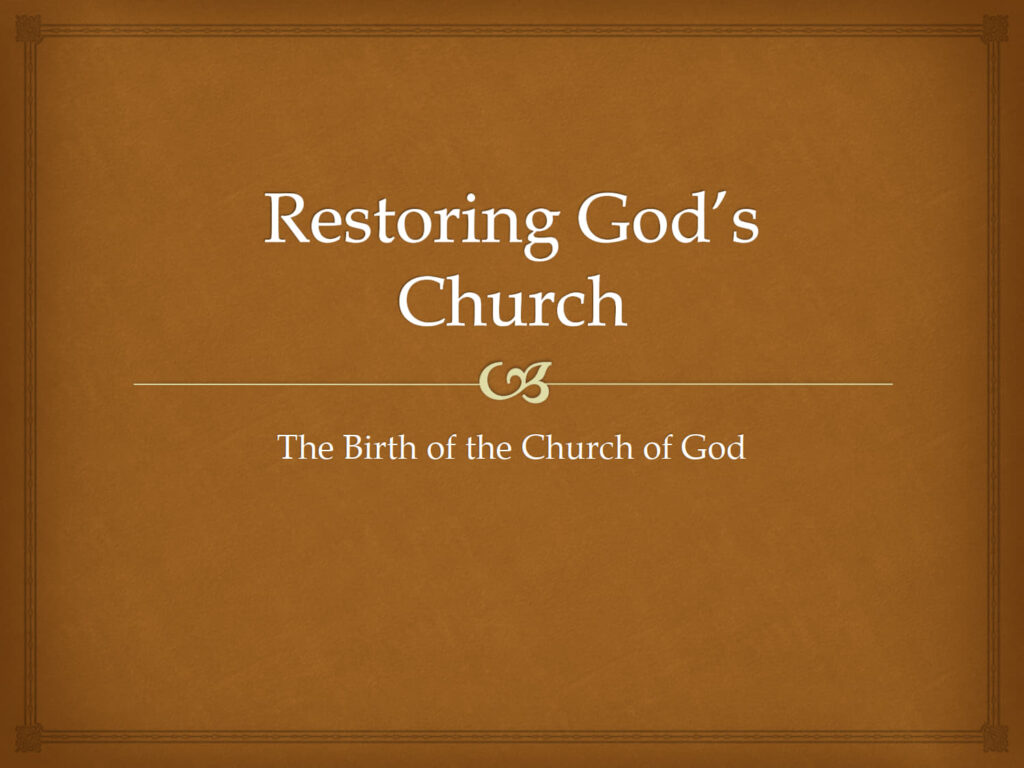
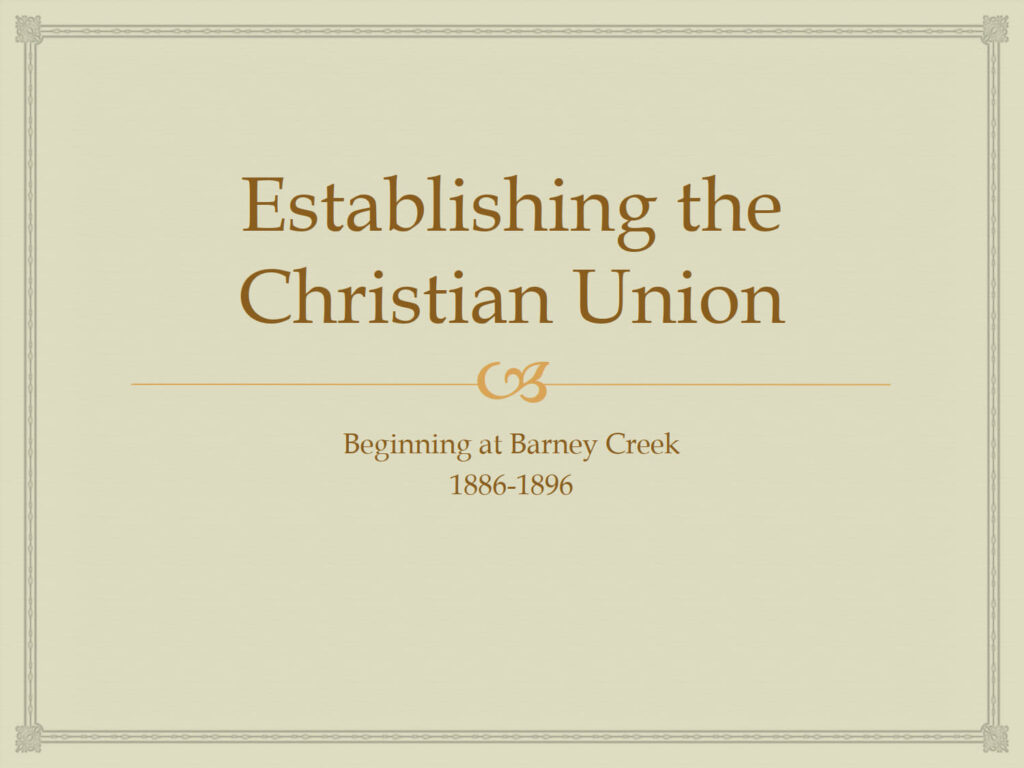
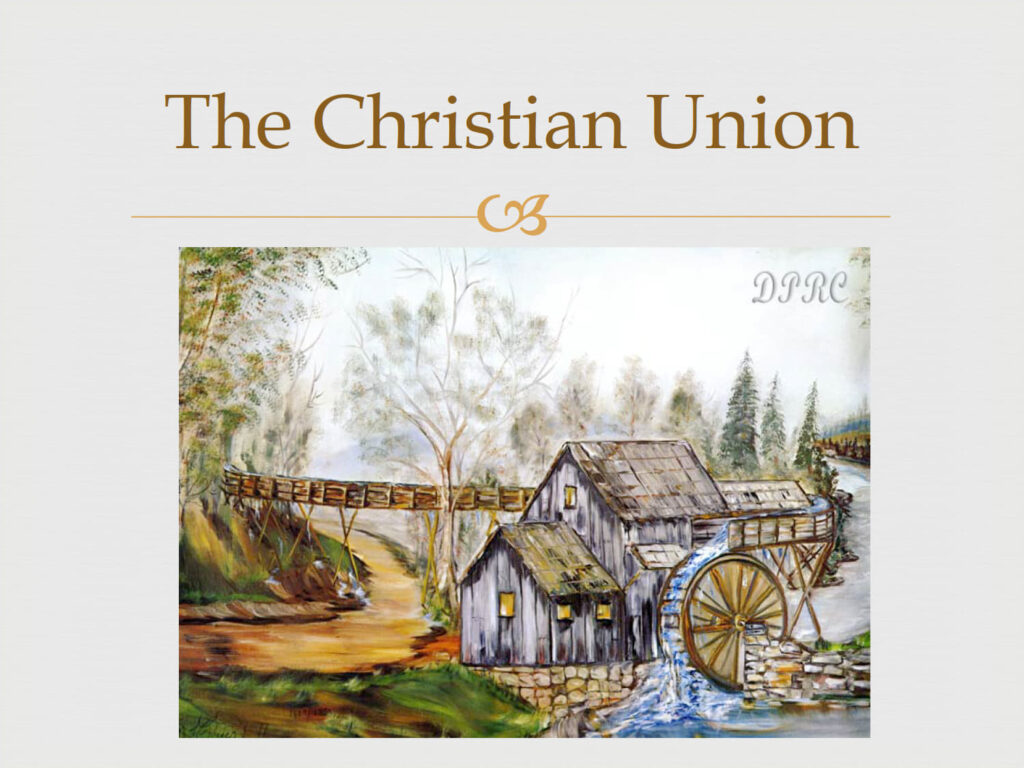
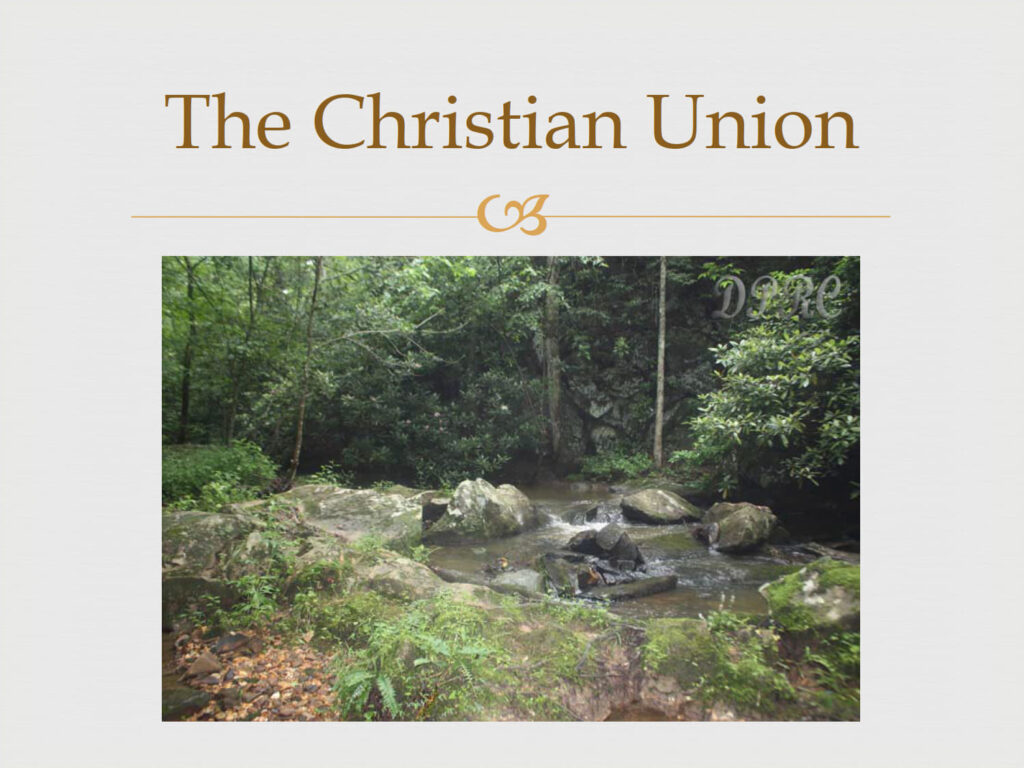
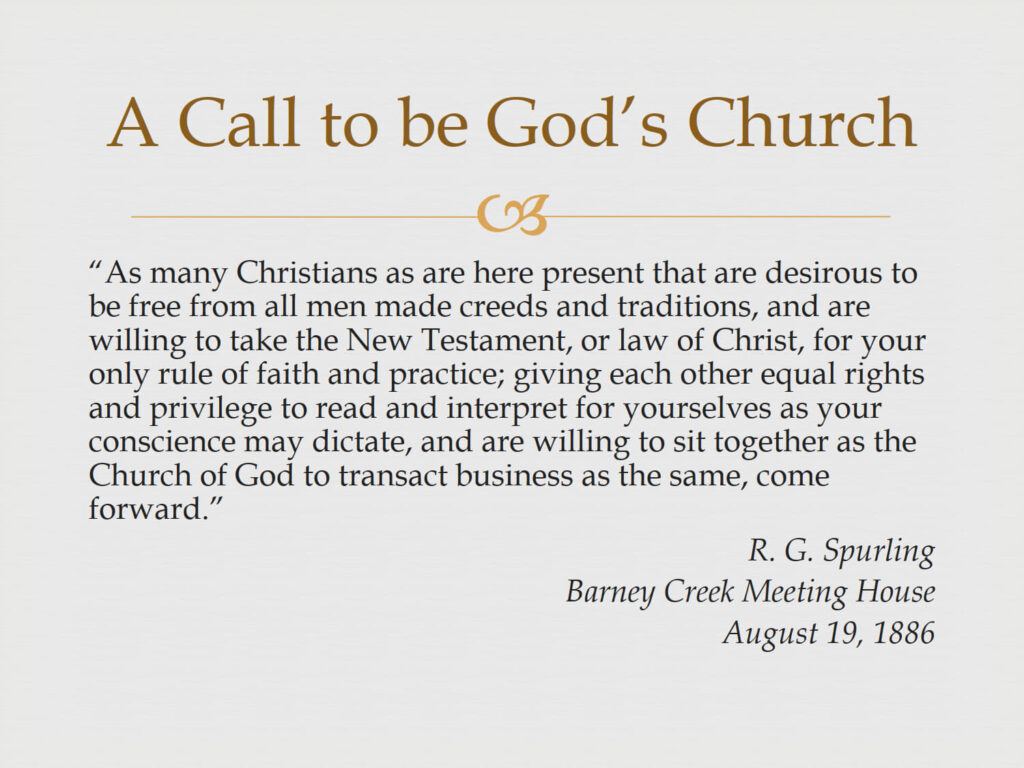
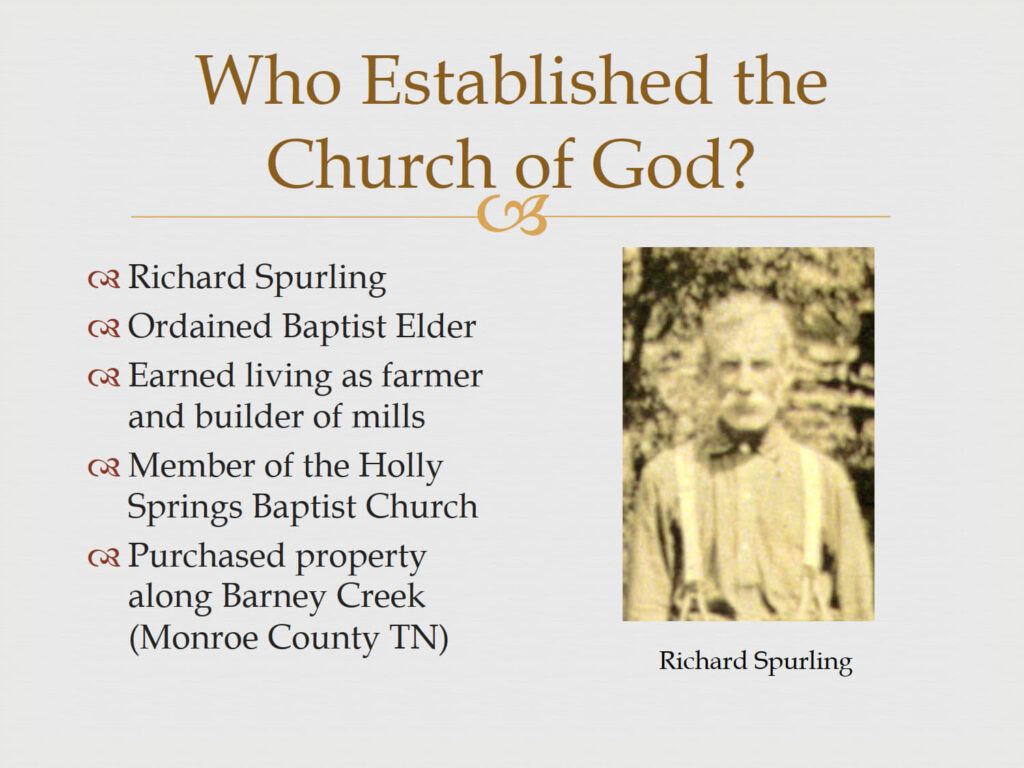
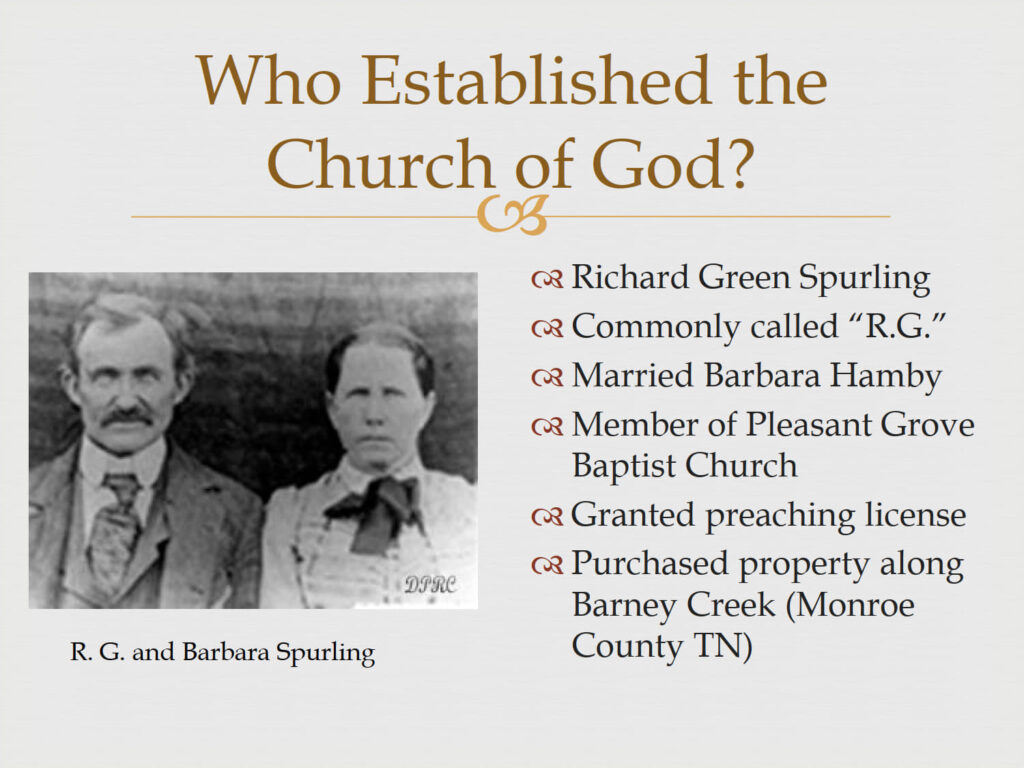
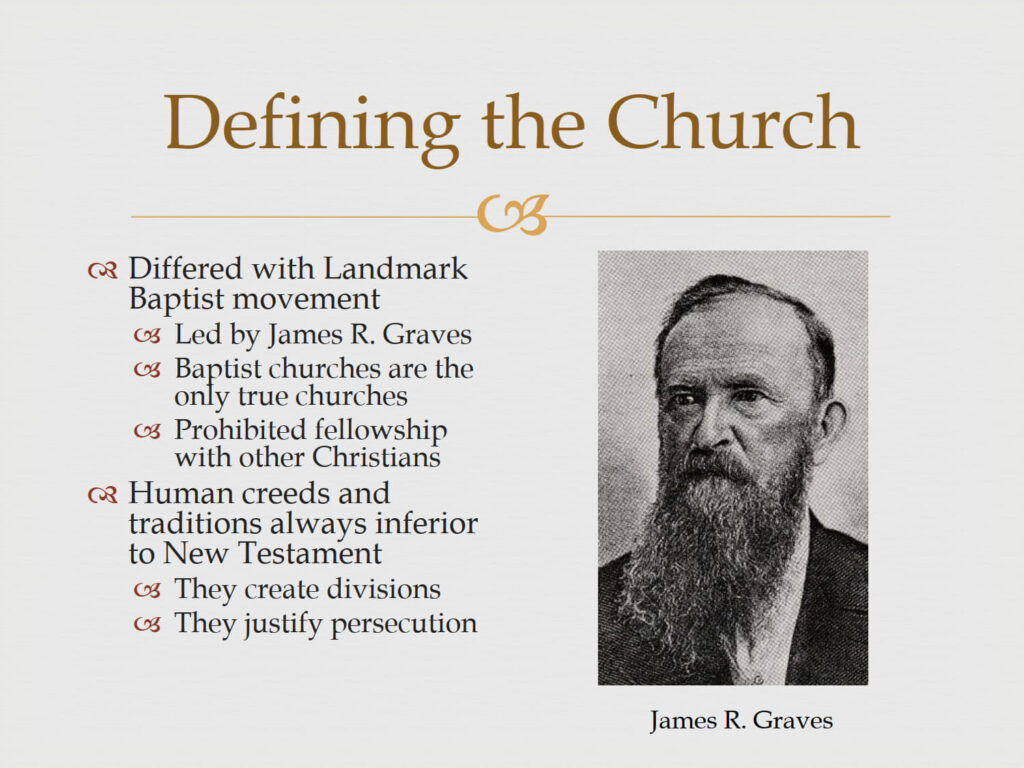
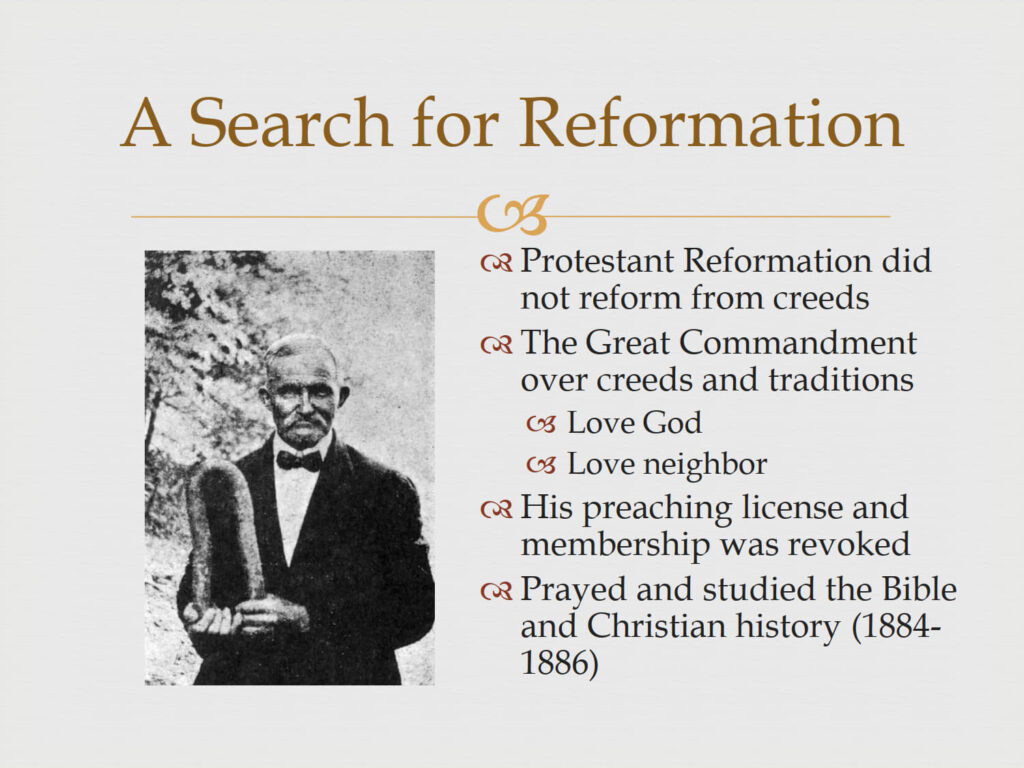
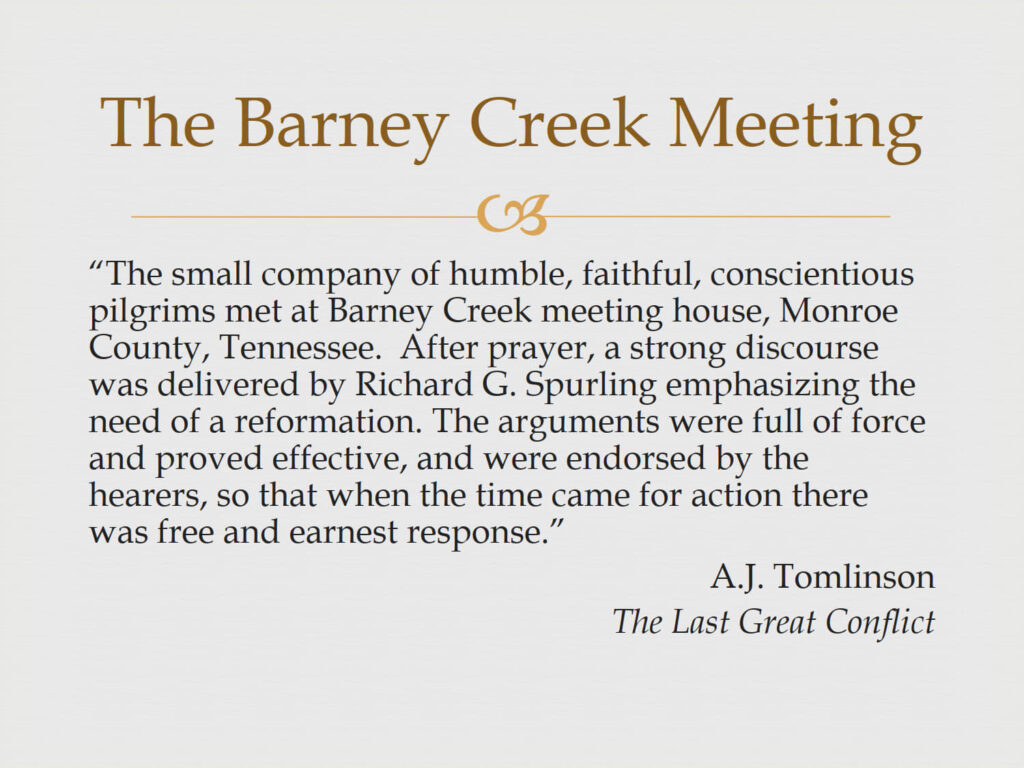
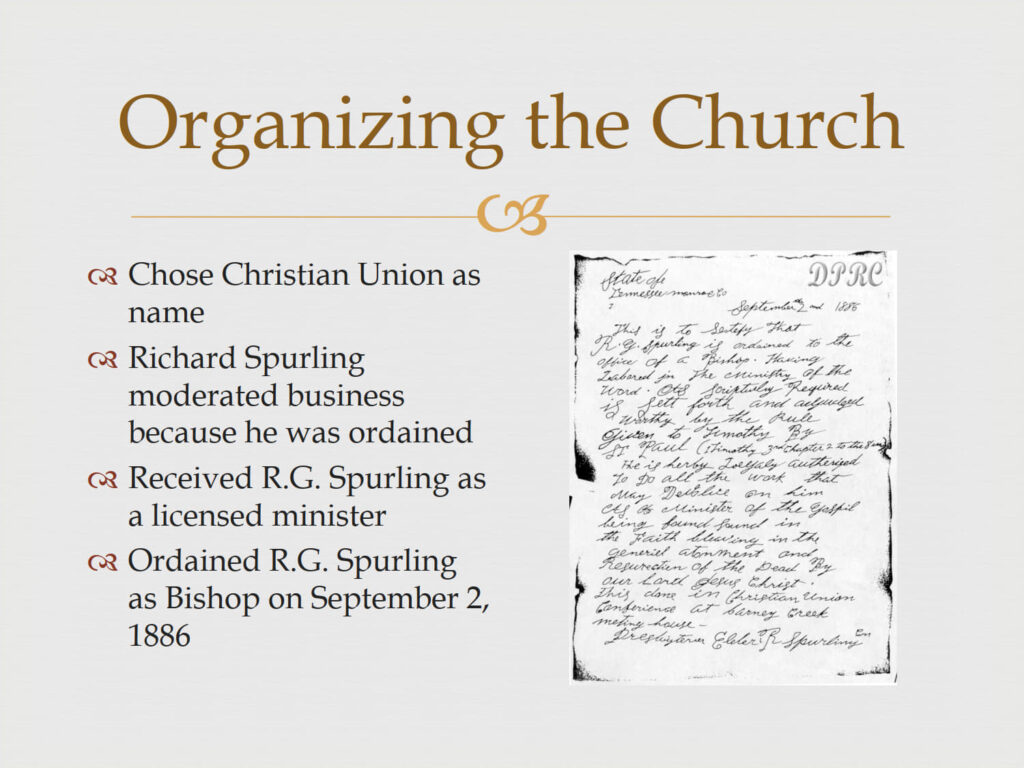
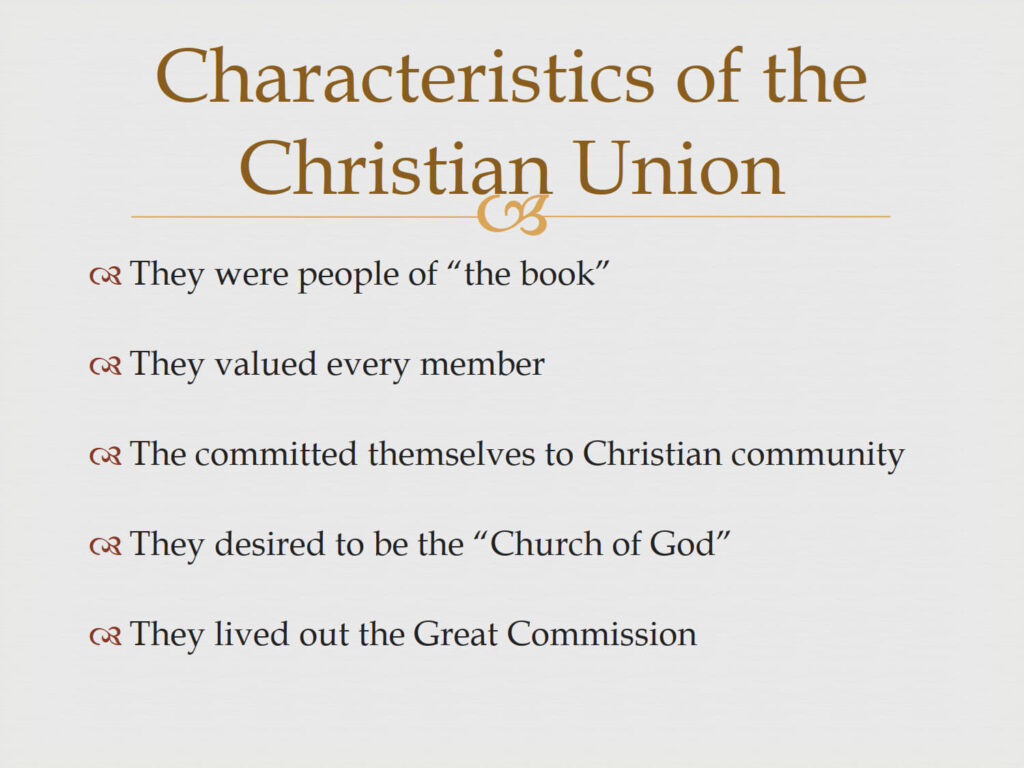
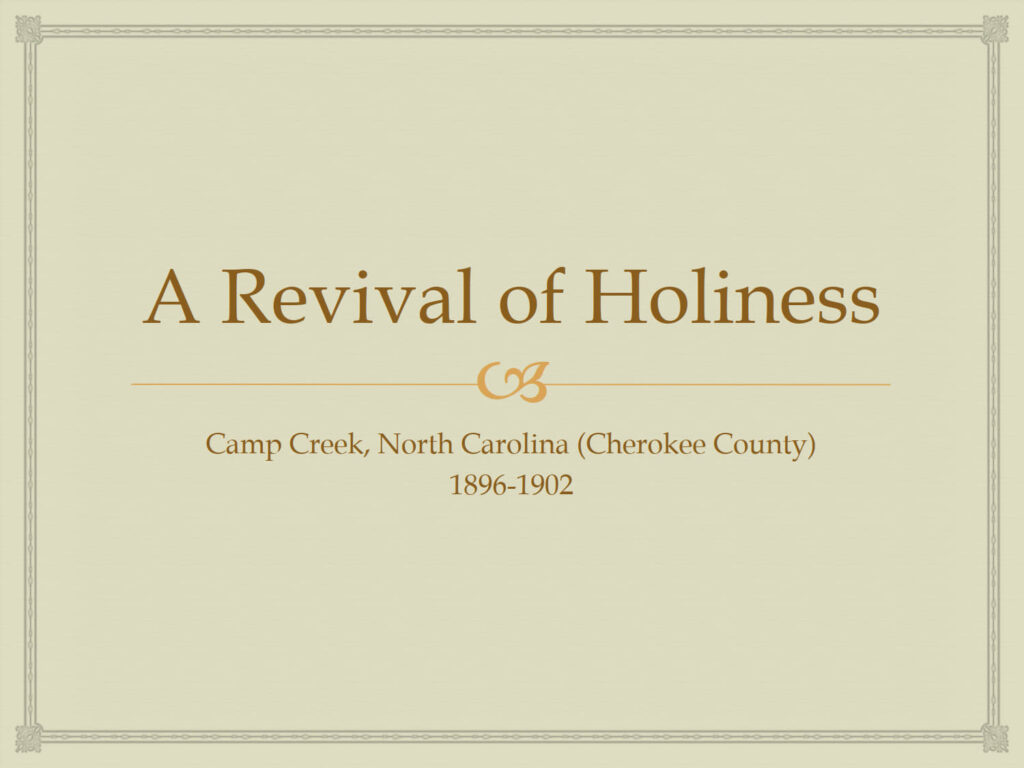
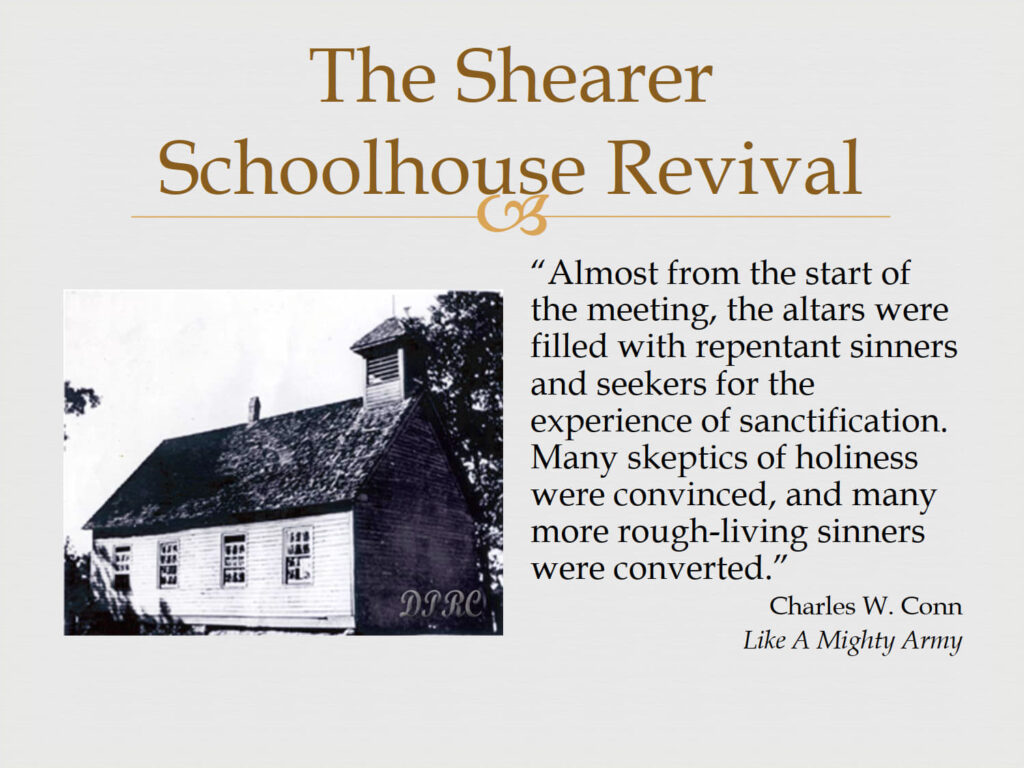
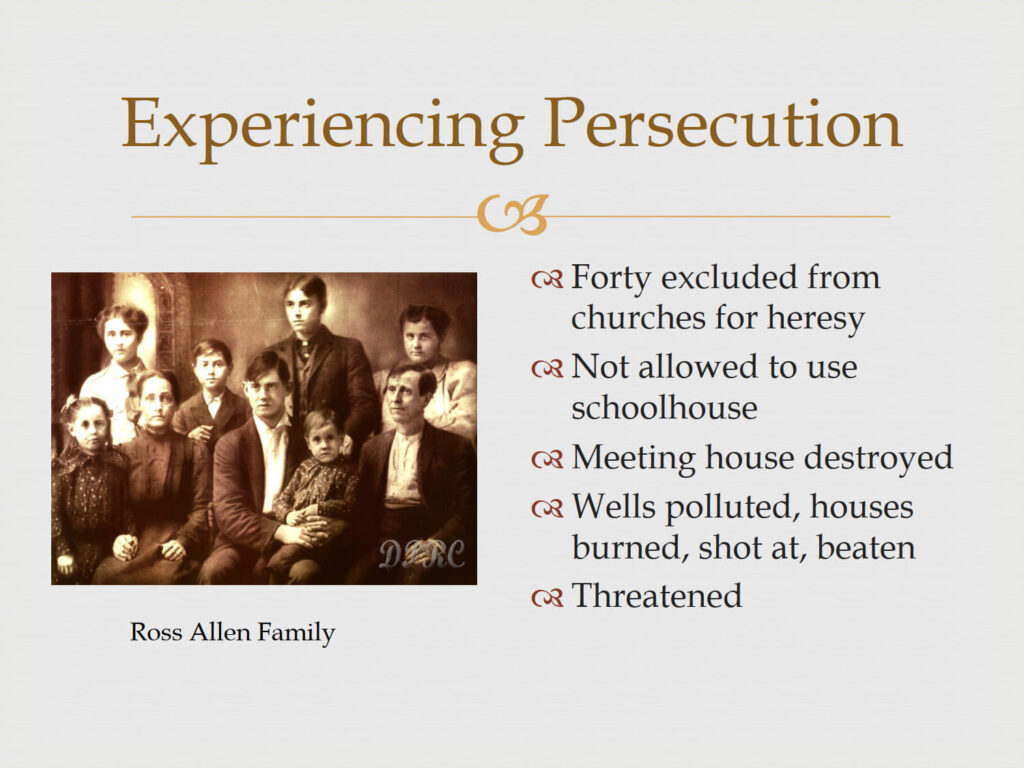

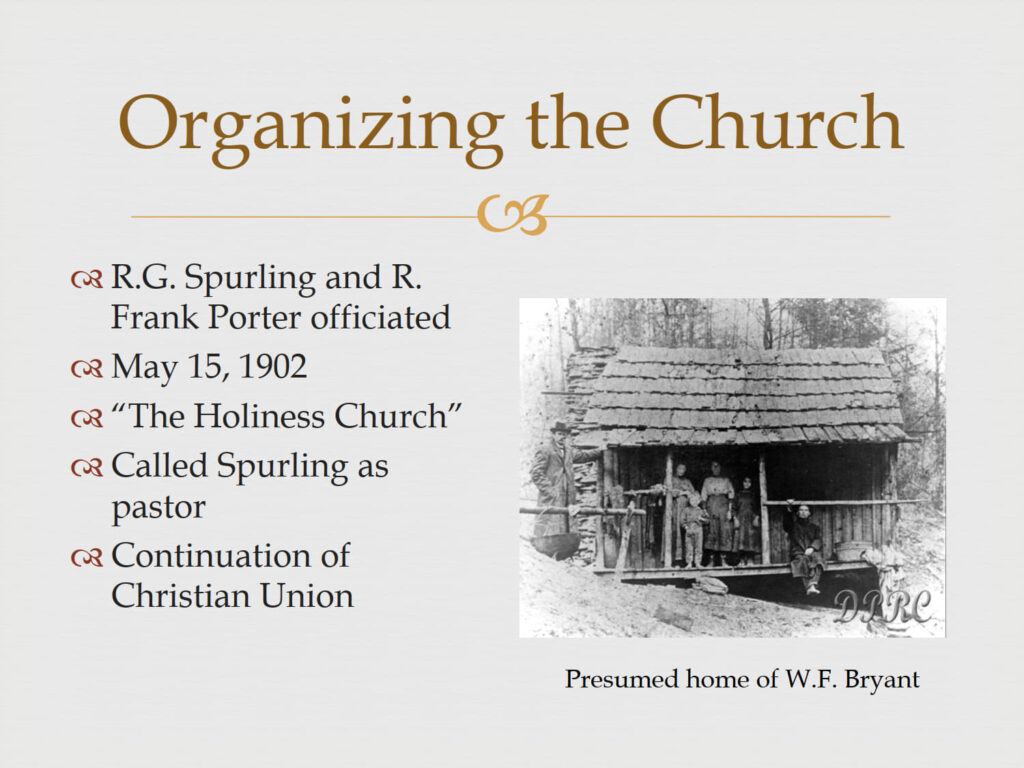
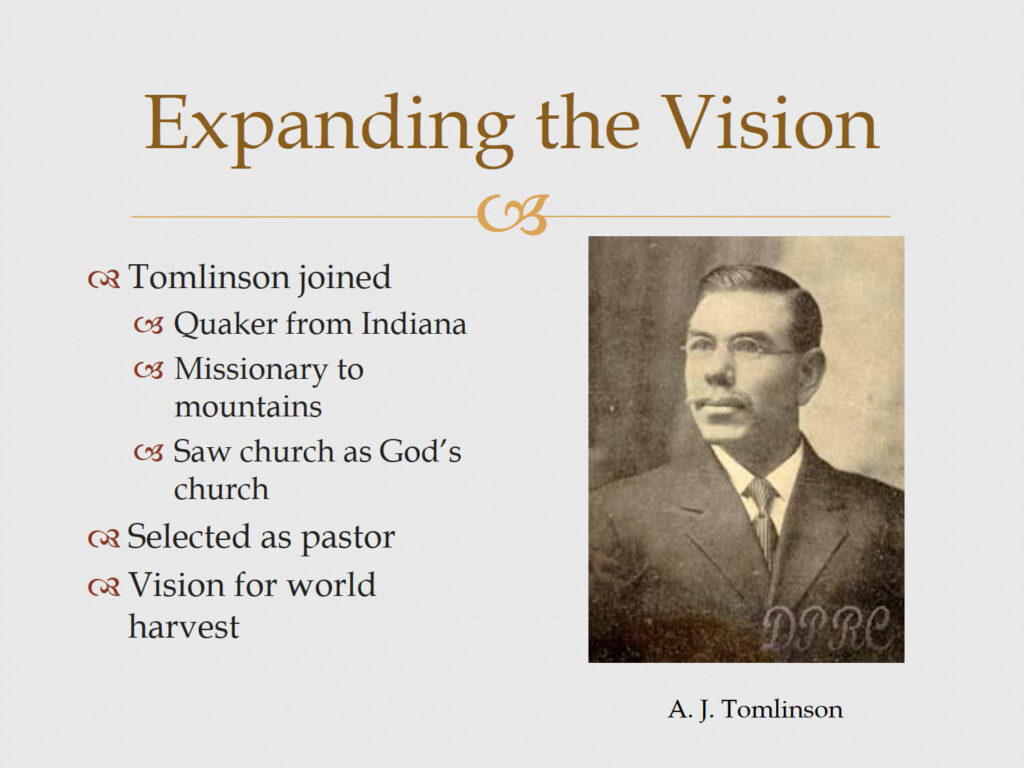


by Dony K. Donev, D.Min.
Historical and Doctrinal Formation of Holiness Teachings and Praxis among Bulgarian Pentecostals (Research presentation prepared for the Society of Pentecostal Studies, Seattle, 2013 – Lakeland, 2015, thesis in partial fulfillment of the degree of D. Phil., Trinity College)
Pentecostal identity was corporately practiced and celebrated within the fellowship of believers through the partaking of Holy Communion. We have otherwise extensively described the Communion service among Bulgaria’s conservatives in Theology of the Persecuted Church (Part 1: Lord’s Supper https://cupandcross.com/theology-of-the-persecuted-church/). Therefore, here we offer just a brief overview of its main characteristics.
- It was done in a time and place directed by the Holy Spirit
- If some did not have water baptism they were taken to a close by river to be baptized while the rest of the church prayed
- Upon returning, if some did not have yet the baptism with the Holy Spirit, the church would pray until all were baptized
- It began with each participant audibly asking all members for forgiveness
- they would also audible respond with the words: WE FORGIVE YOU and may GOD also forgive you
- The communion bread was prepared on the spot baked by women whose names were also reveled in prayer
- All drank from one cup, which strangely for their strict practice of abstinence from alcohol, was filled with alcoholic wine
- Communion was served only to those who had the fullness of the Spirit, and had just requested and were given forgiveness
- The presbyter would quote Jude 20 to each partaking believer thus directing them to audibly speak in tongues before they could participate in communion
- Interpretation often followed to confirm the spiritual stand of the believer
- If there were any leftovers, the Communion elements were served again until all was used
- Communion was incomplete without foot washing as a seal that the whole sacrament was fulfilled.
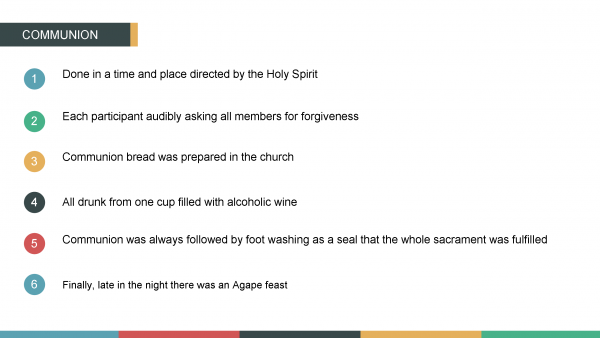
Tags: 365, Bulgarian, communion, corporate, Featured, holiness, news, pentecostals, practice, Research, service, the, within
1896 Shearer Schoolhouse Revival

Location: Camp Creek, North Carolina
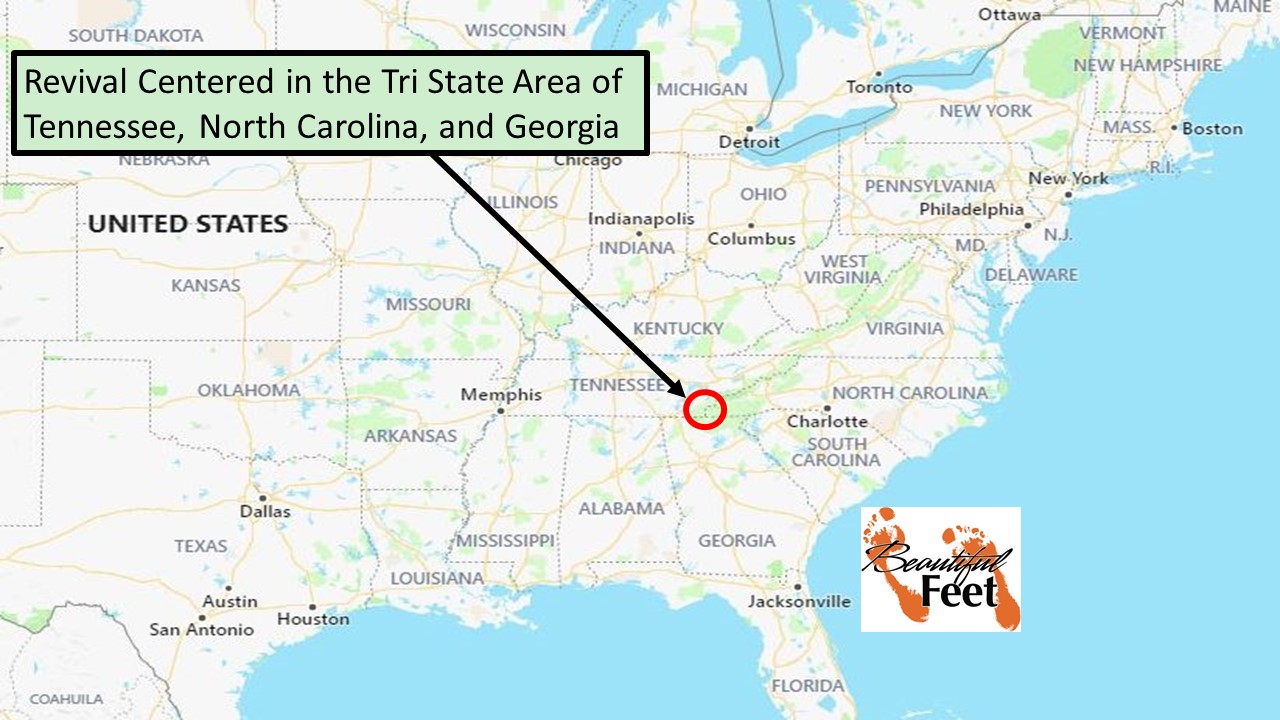
Introduction
Before the 1901 Topeka Outpouring, and before the 1906 Azusa Street Revival, there was the 1896 Shearer Schoolhouse Revival.
Several of the largest Pentecostal denominations trace their roots back to an event that took place at the Shearer Schoolhouse located in Camp Creek, North Carolina.
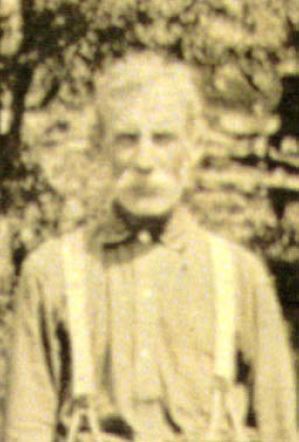
Richard G. Spurling Sr. (1810-1891)
The chain of events that led up to that momentous occasion began in 1884 when 72-year-old Richard G. Spurling (1810-1891), a Baptist preacher, and a few of his friends had grown weary with the spiritual condition in the mountains. They spent several years trying to bring renewal and reform within the churches, but all their efforts failed.
Together with his 27-year-old son, who was also a licensed Baptist preacher (R.G. Spurling Jr., 1857-1935), Spurling called for a gathering to be held on Thursday, August 19, 1886, to see if there was sufficient interest to start a new church.
Gathered that August day were those from Baptist, Methodist, and Presbyterian churches. They assembled in the Spurling family’s grist mill on the banks of Barney Creek, Tennessee. (Some have referred to that grist mill as the “Barney Creek Meetinghouse.”)
During the meeting, Richard G. Spurling Sr. asked those assembled:
As many Christians as are here present that are desirous to be free from all man-made creeds and traditions, and are willing to take the New Testament, or law of Christ, for your only rule of faith and practice; giving each other equal rights and privilege to read and interpret for yourselves as your conscience may dictate, and are willing to sit together as the Church of God to transact business as the same, come forward.

Location of the revival’s beginning in relation to other major cities in the area.

Painting of what the Spurling grist mill on Barney Creek could have looked like. This mill has also been called the Barney Creek Meetinghouse.
Eight out of the group came forward, and with those few they began the church that was named “Christian Union.”
On September 2, 1886, R.G. Spurling Jr., was installed as the pastor of this new church. A few years later, at age 74, the elder Spurling died, never having had the opportunity to see the budding of the great movement he launched.
R.G. Spurling Jr. preached across the mountains for the next ten years, starting churches in different locations, the last one being in Turtletown, Tennessee, only four miles from the Camp Creek church which Bryant had recently started. It was in Camp Creek that God brought an extraordinary revival of holiness to the mountains.
In 1892, William F. Bryant, a Baptist lay preacher licensed through Liberty Baptist Church, began prayer meetings in his home in Camp Creek, North Carolina. His home was located about 12 miles from the Christian Union congregation in Barney Creek. Bryant and Spurling ultimately became good friends and developed a strong working relationship.
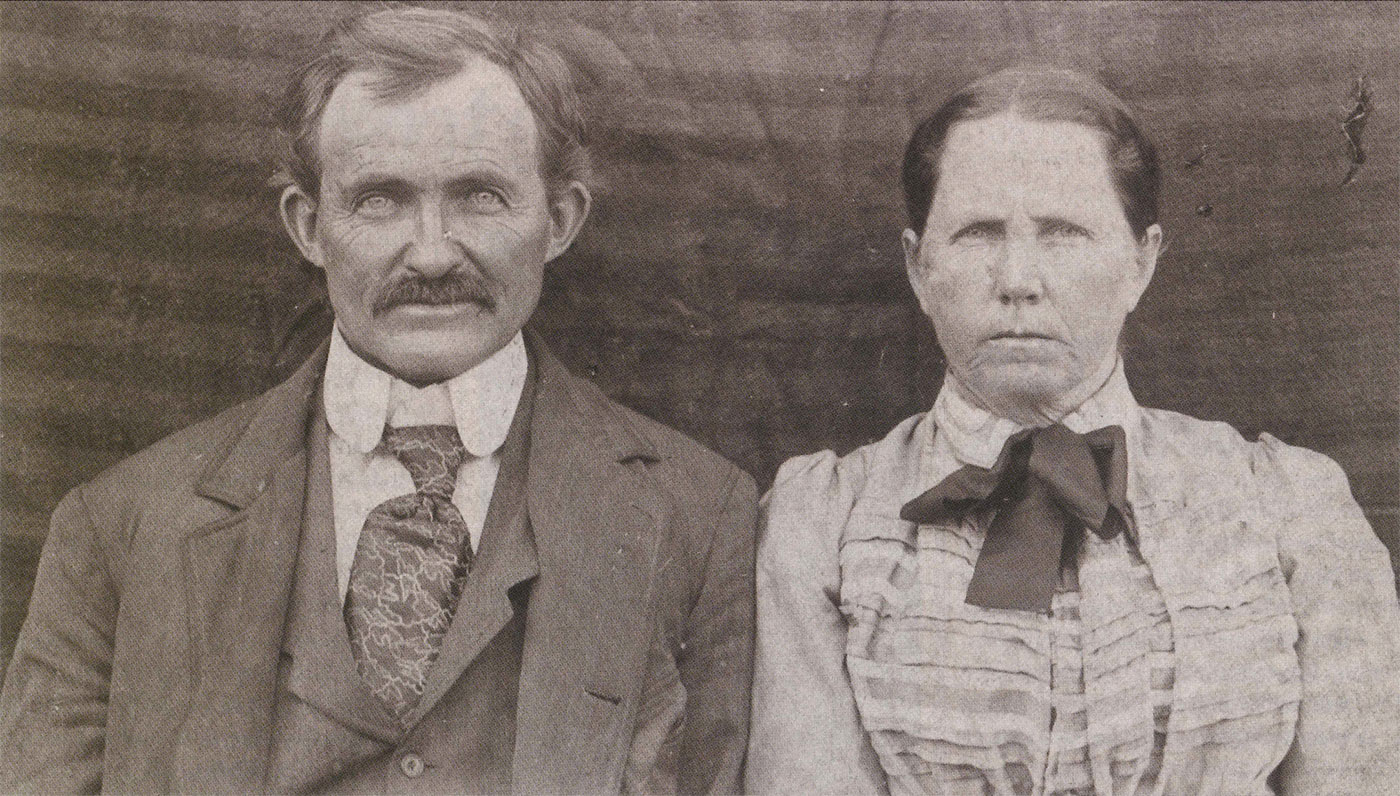
R.G. Spurling Jr. and wife Barbara (earlier picture)
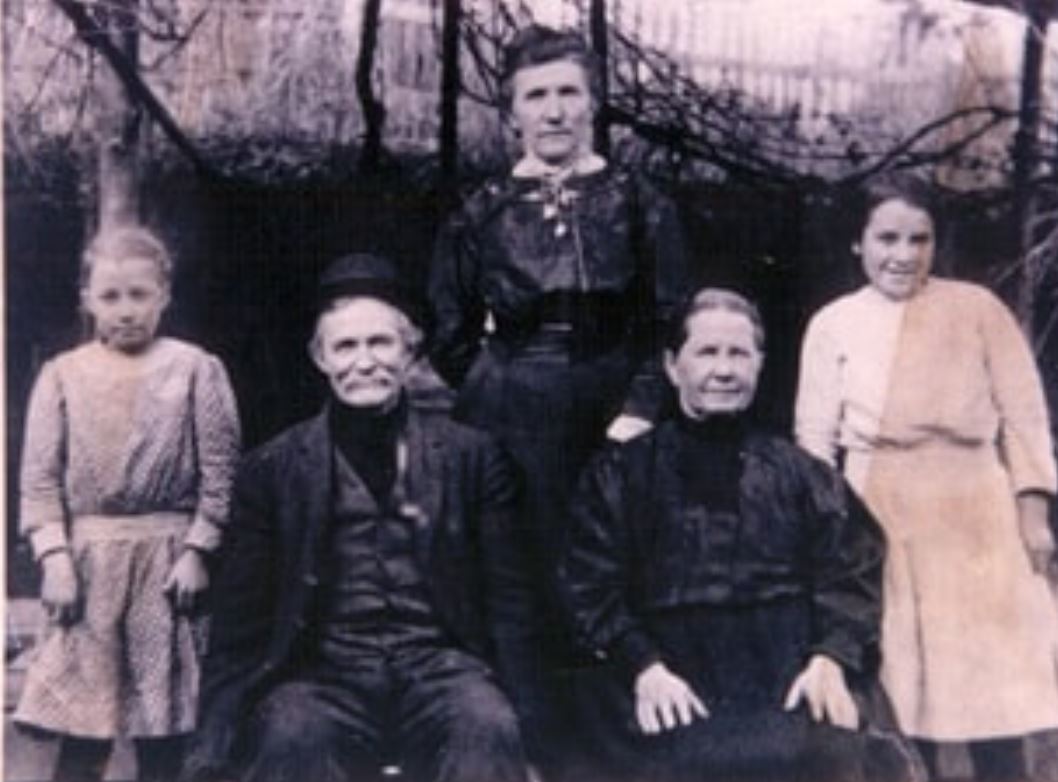
Spurling Family
Extraordinary Prayer & Preparation for Revival
Through W.F. Bryant’s relationship with Spurling, Bryant started a church and Sunday School in Camp Creek, under the Christian Union umbrella. Spurling led his congregation in Turtletown, Tennessee, to merge with Bryant’s congregation, which was located 4 miles away across the state border. This new unity and freedom led the people in the mountains to give themselves fully to prayer and fasting, anticipating God to save many souls.
This highly focused prayer led to a ten-day revival that was conducted in the summer of 1896 by four lay evangelists. These revival services were held in the Shearer Schoolhouse in Camp Creek, North Carolina. People came to this revival from many parts of the mountains.
Almost from the start of the meeting, the altars were filled with repentant sinners and seekers for the experience of sanctification. Many skeptics of holiness were convinced, and many more rough-living sinners were converted. —Charles W. Conn
When the scheduled revival services concluded, the “spirit of revival” continued, and people often met in homes, under brush arbors, or in the Shearer Schoolhouse, as they didn’t yet have a building in which to worship.

Prominent locations involved with the revival. The major city of Chattanooga is given for reference.
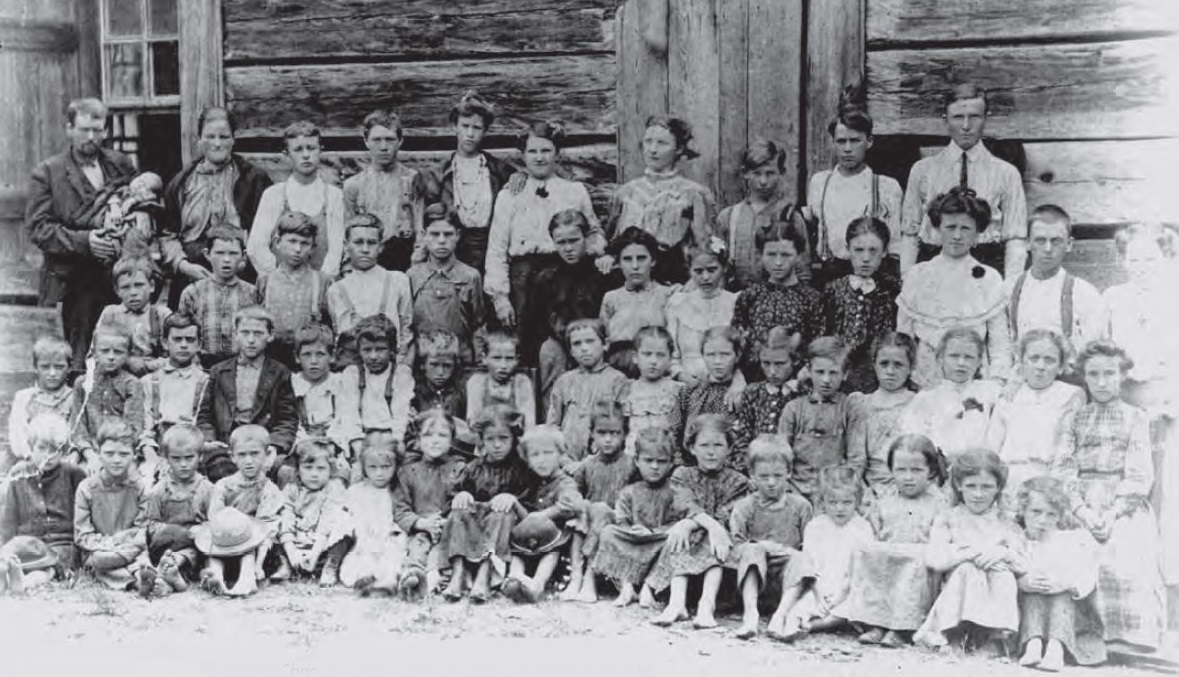
R.G. Spurling Jr. founded this second Christian Union Church at Piney Grove in Monroe County, Tennessee, in 1897.
What Happened
All of the heightened focus on God to move in the mountains continued to inspire and move the people to believe for even greater things from God.
And the interest increased until unexpectedly, like a cloud from a clear sky, the Holy Ghost began to fall on the honest, humble, sincere seekers after God. . . . One after another fell under the power of God, and soon quite a number were speaking in other tongues as the Spirit gave them utterance.”
News of this Holy Spirit outpouring spread to adjoining counties and the people came to witness the phenomenon of Spirit-filled believers speaking in an unknown language. Many sick persons were healed and “hundreds of hard sinners were converted.”
It was a Pentecostal awakening, a recurrence of what happened on the Day of Pentecost. Even though this was a very sparsely populated area in the mountains, “more than 100 persons received the baptism with the Holy Ghost and spoke in tongues.” This was an important event that prepared the way for the universal outpouring that followed ten years later during the 1906 Azusa Street Revival.
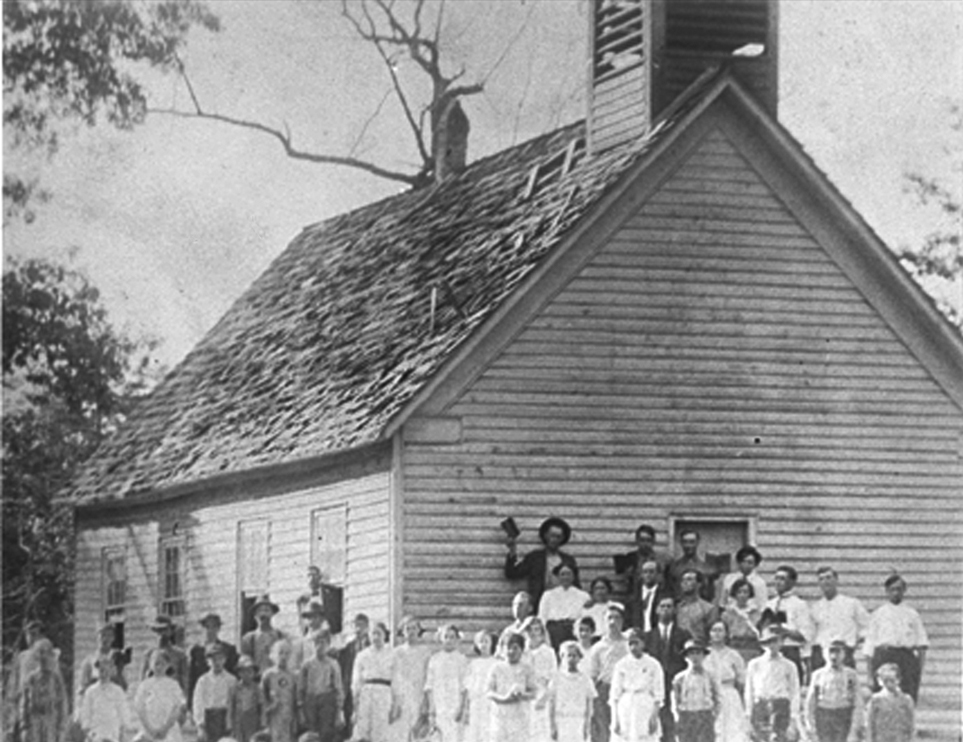
The Shearer Schoolhouse in Camp Creek, North Carolina, location of the 1896 holiness revival.

Wording on the Shearer Schoolhouse Monument

Shearer Schoolhouse Monument
Persecution
Beginning in 1899, the Liberty Baptist and Pleasant Hill Baptist churches excommunicated forty of their members for their participation with the Christian Union congregations (house churches) in the area, the reasons being the style of worship and doctrinal differences (R.G. Spurling Jr. was licensed to preach through Pleasant Hill Baptist, and William F. Bryant through Liberty Baptist Church. Both were excommunicated.)
A subsequent act of the Baptist churches was to prevent the Christian Union congregation from using the Shearer Schoolhouse for services. It was then that Dickson Kilpatrick donated land across the road from the schoolhouse on which a log meetinghouse could be constructed. The persecutors responded by first attempting to destroy the building with fire and dynamite–both attempts failed. It was then that 106 leading members of the community dismantled the log meeting house and burned the logs. This mob included ministers and deacons from neighboring churches, one justice of the peace, and one sheriff.
When arrests were finally made for the destruction of the property, and guilty parties were put on trial, Bryant and the Christian Union congregation simply asked the court to forgive them.
Other Types of Persecution Endured
1. Homes where meetings were held were burned.
2. People were whipped.
3. Homes were shot at.
4. Stones were thrown at buildings.
5. Water sources were contaminated.
6. Children were harshly treated by teachers at school, as well as beaten by other children. This required parents to take their children out of school.
These early Pentecostal pioneers suffered for about six years from this type of persecution, yet they had found a new freedom, power, and purpose for their life in this new Pentecostal experience which could not and would not be extinguished by their persecutors.
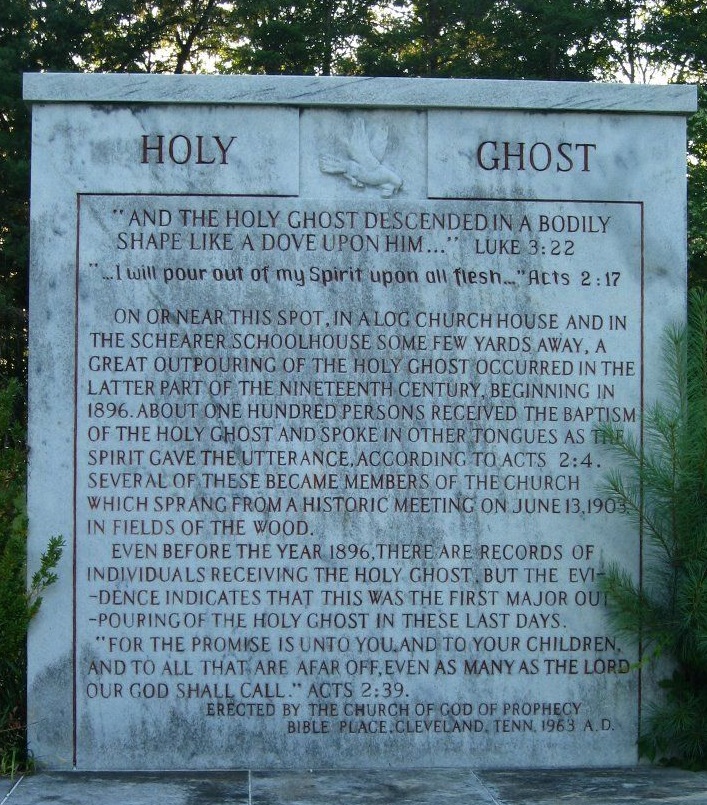
Monument today where the log church once stood
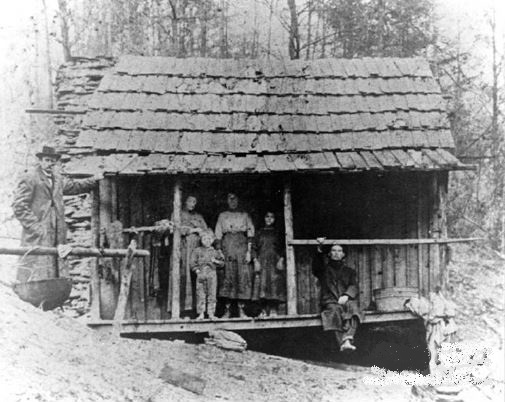
Home of William F. Bryant
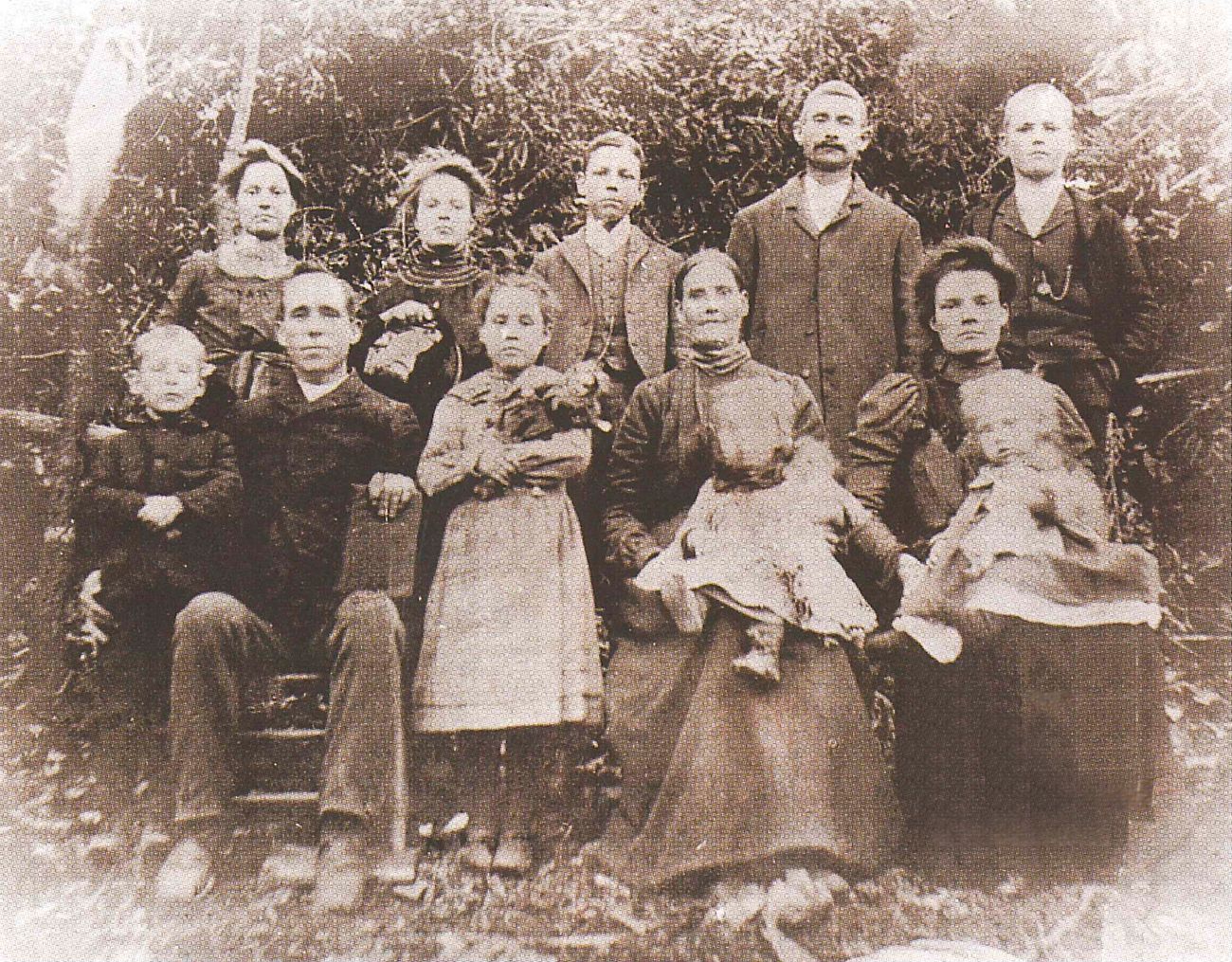
William F. Bryant (seated left) and family
Governmental Order (fanaticism & false teachings)
Without any form of government in the Christian Union congregations, false teachings began to emerge, as well as fanaticism. This led Bryant and Spurling to develop a form of government, in conjunction with establishing doctrines, that would unite the believers and at the same time ward off the false teachings.
The restructuring of the Christian Union took place on May 15,1902, in the home of Bryant. This restructuring led to a name change for the churches from “Christian Union” to the “Holiness Church at Camp Creek.”
Following the reorganization, new preachers, deacons, and church members began to be added to the churches. One notable pastor that joined the Holiness Church on June 13, 1903, was the Quaker from Westfield, Indiana, A.J. Tomlinson.
A.J. Tomlinson
Tomlinson had come to the mountains in 1899 to serve as a missionary. He had established a school, an orphanage, and a clothing distribution center to care for and evangelize the poor.
Tomlinson had become acquainted with the Holiness Church in Camp Creek, and on the morning of June 13, 1903, following his morning prayer on the mountain behind Bryant’s home, Tomlinson became convinced that the holiness congregation was “the Church of God of the Bible.” The leadership of the Holiness Church had confidence in Tomlinson and immediately selected him as pastor for the church in Camp Creek.
Tomlinson’s vision to spread the gospel around the world soon led to the establishment of other Holiness Church congregations, the first General Assembly in 1906, and a change of name from the “Holiness Church” to “Church of God” in 1907. What began as a trickling mountain stream at Barney Creek became a surging river of global ministry.

W.F. Bryant and R.G. Spurling Jr., at the home of J.C. and Melissa (Shearer) Murphy, which was the site of the Church of God’s first General Assembly, conducted on January 26-27, 1906, at Camp Creek, North Carolina
Today the Shearer-Murphy House is maintained by the Church of God of Prophecy as a historical landmark. The home is located on River Hill Road not far from Fields of the Wood.

Historical marker sign at the intersection of River Hill Road and North Carolina Route 294
Results of the Revival
Not less than nine denominations emerged from the Shearer Schoolhouse Revival. At least five of those are headquartered in Cleveland, Tennessee. We list two prominent ones here.
Church of God (Cleveland, Tennessee)
In December of 1904 the Holiness Church of Camp Creek had its center of activity moved from Camp Creek, North Carolina, to Cleveland, Tennessee. That was when A.J. Tomlinson moved his family there to start the North Cleveland Church of God. That church eventually became the “mother church” for the budding denomination. Cleveland is now where the headquarters for the Church of God is located, and home to Lee University.
On January 11, 1907, the Holiness Church of Camp Creek changed its name to Church of God, and has kept that name since.
In 2018, the total worldwide membership of the Church of God was 7,468,083. Of that total, 1,189,304 members were in the United States and Canada, making the Church of God the 22nd largest Christian denomination in the United States.
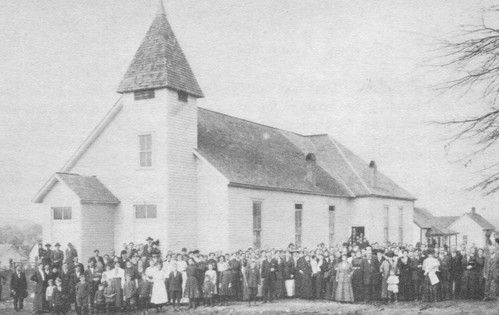
North Cleveland Church of God, circa 1906
Reflection on on U.S. Department of State recognizing the Bulgarian Chaplaincy Associations
 BREAKING NEWS [October 8, 2007]
BREAKING NEWS [October 8, 2007]
Original source archive: U.S. Department of State:
https://web.archive.org/web/20080709061910/http://www.state.gov/g/drl/rls/irf/2007/90168.htm
For immediate release: Bulgarian Chaplaincy Associations Recognized by U.S. Department of State
U.S. Department of State has released its annual International Religious Freedom Report for 2007. In the section about Bulgaria, the work of Cup & Cross Ministries has been noted through the recognition of the Bulgarian Chaplaincy Association.
Cup & Cross Ministries has worked toward the establishment of the Bulgarian chaplaincy Association since the year 2000. After five years of training chaplains, strategic professional placement and providing ministry in all respective areas of chaplaincy, in 2005 we began the process of registration with the Bulgarian government. This process was both difficult and a long test of our endurance. Although we were not openly denied registration under the 2002 Religious Act, various courts throughout Bulgaria hesitated and delayed our legal registration. Our ministry activities were closely watched and members of our staff were called in for interrogation on various occasions. After resorting to international human rights and religious freedom organizations, finally on February 23, 2007 the Bulgarian Chaplaincy Association received registration by the Sofia Municipality Court to become the first legal chaplaincy organization in Bulgaria officially recognized by the Bulgarian government. The current U.S. Department of State report overviews the above process. The direct quote of the report follows:
International Religious Freedom Report 2007
Released on September 14, 2007
http://www.state.gov/g/drl/rls/irf/2007/90168.htm
Section II. Status of Religious Freedom
Improvements and Positive Developments in Respect for Religious Freedom
Some religious denominations reported that the Religious Confessions Directorate had become more active in assuring that national and local authorities respect and promoted religious freedom and that the national government was more receptive to their concerns. For example, a Protestant group, the Bulgarian Chaplaincy Association, gained legal status on February 23, 2007. The association represents approximately 120 Protestant pastors and individuals mainly affiliated with the Church of God and Assemblies of God but also includes Baptists and Lutherans.
Almost three decades ago, we established the Bulgarian Chaplaincy Association with a vision for ministry in the Bulgarian army, Ministry of Internal Affairs, jail and prison systems, Bulgarian seaports and airports, and the healthcare system. Out of these five goals set before us in 2006 we have fulfilled them all:
1. Tolerant and equal representations of all confessions in the chaplaincy ministry
2. The implementation of a contextualized chaplaincy model
3. The integration of chaplaincy education in all Bulgarian theological higher educational institutions
4. And the educational and consultant work on government and church levels
except:
5. The establishment of legal grounds for regular paid chaplaincy service in the Bulgarian army, Ministry of Internal Affairs, jail and prison systems, Bulgarian seaports and airports, and the healthcare system.
After designing and teaching the Masters of Chaplaincy Ministry program in two major evangelical universities in Bulgaria, we now have some of our trained chaplains working in jails, prisons, healthcare, civil emergency services and the corporate/political level. The legal system in Bulgaria, however, is yet to provide the proper measure for restoring chaplaincy in Bulgaria’s armed forces. To this final step fulfillment we pledge out support in 2016.
Bulgarian Chaplaincy Association: Vision and Resolution
Bulgarian Chaplaincy Association
Resolution No. 1
We,
The founding members of the Bulgarian Chaplaincy Association in its first national assembly today August 19, 2006 in hotel Diana Palace, Yambol
In regard of:
1. Bulgaria’s membership in NATO and its upcoming integration in the European Union
2. The transformations within the Bulgarian Army from mandatory toward standard paid service and the participation of Bulgarian contingent in NATO and UN missions
3. Contract agreement for NATO airbases on Bulgarian territory
4. The strategic renewal of chaplaincy ministry in the Bulgarian army
5. And the present need of chaplaincy ministry integrated in the Bulgarian army, Ministry of Internal Affairs, jail and prison systems, Bulgarian seaports and airports, and the healthcare system,
Declare our support toward:
1. The establishment of legal grounds for regular paid chaplaincy service in the Bulgarian army, Ministry of Internal Affairs, jail and prison systems, Bulgarian seaports and airports, and the healthcare system
2. Tolerant and equal representations of all confessions in the chaplaincy ministry
3. The implementation of a contextualized chaplaincy model
4. The integration of chaplaincy education in all Bulgarian theological higher educational institutions
5. And the educational and consultant work on government and church levels.
We, the founding members of the Bulgarian Chaplaincy Association will work toward the renewal, popularization and equal religious representation of chaplaincy ministry in all professional areas.
August 19, 2006
Diana Palace, Yambol
Tags: associations, Bulgarian, chaplaincy, Department, events, Featured, Missions, news, publication, recognizing , reflection, Research, state, the, u.s.
Our Bulgarian Chaplaincy Association celebrates 26 years of Military Ministry in Bulgaria since the first event co-hosted by the Bulgarian Armed Forces and government officials in 1997.
2018 The Road toward a Balkan Multi-Ministry Center and Legal Status
2017 Bulgarian Chaplaincy Association: Legal Case Renewed
2015 Revisting the Integration Proposal with Local NATO Programs by Bulgarian Chaplaincy Association
2014 Bulgarian Chaplaincy Association: Vision and Resolution Reaffirmed
2012 First Class of the Master’s of Chaplaincy Ministry Program
2011 Master’s of Chaplaincy Ministry Program Continues
2010 Master’s of Chaplaincy Ministry Program begins in Sofia, Bulgaria
2009 Bulgarian Chaplaincy Association holds an introductory chaplaincy course in Yambol, Bulgaria
2008 The Case of a NATO Chaplaincy Model within the Bulgarian Army released
2007 Bulgarian Chaplaincy Associations Recognized by U.S. Department of State
2006 Registration for the Bulgarian Chaplaincy Association Rejected by Bulgarian Court
2005 The Bulgarian Chaplaincy Association presented before the Bulgarian Evangelical Alliance
2004 Three U.S. Bases in Bulgaria to be Built by 2010
2003 The Case of a NATO Chaplaincy Model within the Bulgarian Army
2002 First Balkan Chaplaincy Conference at the Central Church of God in Sofia, Bulgaria
2001 Church of God Chaplaincy Commission to visit Bulgaria
2000 Euro-seminar: Christian ethics in the military forces
1997 First Military Ministry Seminar in Veliko Tarnovo
With all this accomplished, in the beginning of the 21st century law and chaplaincy meet on the road to democracy as Bulgaria remains the only country in NATO without military force chaplaincy. But before chaplaincy could be legalized completely and endorsed by the state to its full functionality, several changes must be undergone. Some of them are:
- Legal provision allowing chaplains to work as staff in the army, which guarantees the equal presence of protestant chaplains as well.
- The approval, acceptance and implementation of a NATO based model for chaplaincy within the structures of the Bulgarian Army.
- Periodical and systematic educational strategy toward chaplaincy workers among Bulgarian evangelicals.
- A paradigm for cooperation of Bulgarian chaplains from various ethnic, religious and cultural backgrounds.
- Further research publications to enhance the efficiency of chaplaincy within the Bulgarian national context.
Current Context of Chaplaincy in Bulgaria
We are proud to announce that the Master’s of Chaplaincy Ministry Program, we designed and launched in Bulgaria in 2006, has been selected to be part of the Social Service Program of New Bulgarian University. After being for years a valuable part of the regular curriculum of the Bulgarian Evangelical Theological Institute and the St. Trivelius Institute in the capital Sofia, the chaplaincy program has received the highest level of recognition as successful graduates will be finally able to receive government recognized degrees and apply their knowledge and training in chaplaincy on a professional level. The chaplaincy program can also serve within the Integration Proposal of local NATO programs and be instrumental in dealing with the enormous wave of Middle East migrants crossing through Bulgaria today.
The fall of the Berlin Wall introduced a new reality that Bulgaria was not prepared to embrace. The end of Communism was unable to tear down the communist mentality. Today, an entire Bulgarian generation lives with the scars inflicted by their experience under years of the Communist Regime, while another generation lives with an immense historical gap that has formed a new political, social, economical and cultural reality.
Three points are worth noting about Bulgaria’s Postcommunist context. First, in the beginning of the 21st century Bulgaria is left with armed forces, which were organized and influenced by the Soviet model and still act accordingly. The bureaucratic infrastructure disallows and discourages any changes apart from carefully chosen decisions that keep the army’s activities to the minimum possible. The two main factors needed for any change to occur, namely decision-making processes and chain of command, still operate under an Eastern Soviet paradigm.
Second, atheistic morale has gained the status of a positive military qualification in the Bulgarian military. This may sound familiar for any given army; however, in most cases it replaces a religious attitude with an atheistic one. In the Postcommunist context, atheistic beliefs pervade and even when a soldier experiences a genuine need for spirituality, in most cases s/he has no religious root to which to return. This lack of alternative or spiritual choice results in a pessimistic morale, intensified by the required mandatory military services.
Third, a Postcommunist mentality with definite Balkan characteristics rules not only the army but also the country as a whole. The economical, political and cultural crises have remained an undividable part of Bulgaria’s reality in the past 16 years. There, Postcommunist mentality holds captive every progressive thought and idea.
It is natural to conclude that the active solider within the Bulgarian Armed Forces is left without much choice when it comes to his/her personal and spiritual development. A positive career development is possible only when pressed by the economical factors one accepts to be part of a highly inactive bureaucratic machine. On the other hand, any attempt for spiritual growth is constrained and receives little privilege to become fully expressed. Naturally, such dynamics decrease one’s motivation for further development due to the lack of morale emerging from a personal spirituality. And because an army without a spirit is no army at all, the current condition of the Bulgarian Army is in much need of revival.
Also important [click to read]:
Tags: association, Bulgarian, celebrates, chaplaincy, Featured, ministry, Missions, news, publication, Research, years
By Dallas Bogan (Reprinted with Permission. This article was published in the LaFollette Press)
While many churches in the South had already established their existence and their doctrines, an invitation went forward to those who wanted to fully establish the readings and beliefs of the Bible as it was written. With this request a small group of nine believers formed the Christian Union on the banks of Barney Creek in Monroe County, Tennessee, on August 19, 1886. Activities of this joining together on a hot scorching day in the Unicoi Mountains in eastern Tennessee are not known to any degree, but their mission was fully accomplished. R.G. Spurling was selected as pastor of the church while Richard Spurling, his father, moderated the proceedings.
The small congregation knew it was futile to “reform” their own existing churches and so decided to “form” their own church. The intent was to re-establish sound scriptual doctrines of the Bible, and to promote evangelism and Christian service.
Barney Creek still remains a small stream that flows quietly through the mountains. Livelihood in this part of the Appalachian Mountains has still much to be desired. However, early folks in this part of the mountains who sought God found the New Testament Christianity and gathered to later become the Church of God, as we know it today. At a later time the experiences of sanctification and Spirit baptism were added.
This vision of Christian unification was the spiritual desire of R.G. Spurling and his father Richard Spurling, the former being a licensed minister in the Missionary Baptist Church.
Richard Spurling was an ordained elder and began to seek God regarding the abuses he saw in the local churches around him. He was quite perterbed concerning the spiritual neglect and ill treatment he witnessed in these congregations. He was also troubled with challenging traditions and creeds that he deemed a hardship for God’s people.
Calvin, Luther and other famous reformers had brought about many changes to the church such as a “right belief” rather than a “true relationship” with Jesus Christ. These gallant reformers’ changes concentrated more-or-less on creed rather than the leading of the Holy Spirit and one’s own principles.
The focal point of R.G. Spurling was Christianity and the law of love rather than creed or doctrine, in which the latter could possibly divide Christians. He believed that the New Testament was the “only infallible rule of faith and practice” and contains everything “necessary for salvation and church government.”
Spurling was a part of the broad re-establishment that moved through the church world in the United States during the 19th century. At this time, the Christian Union, similar to other groups such as the Churches of Christ and Churches of God (Anderson, Indiana), likened to reinstate New Testament Christianity. The New Testament was given different emphasis by these groups, but all wanted to restore some part of the apostolic church. Some of these groups focused on government, some on everyday life, some on the message, but all longed to return to contemporary Christian life, an important item that had been lost in the superseding centuries. Spurling saw in some teachings that a coarseness and individuality subdued the Gospel and led to dividing the body of Christ more so than to Christian unity.
A.J. Tomlinson, a friend of R.G. Spurling’s, wrote that Spurling preached whenever and wherever he had an opportunity. Tomlinson wrote that Spurling “in this way the minds of the people were continually agitated, and gradually prepared for the work of the Spirit that was to follow. For ten years this servant of God prayed, wept and continued his ministry against much opposition and under peculiar difficulties, before seeing much fruits of his labor.”
Benjamin Hardin Irwin acquired a more intense tactic to the Christian life and taught a “third blessing” called “the fire.” He structured, in Iowa, in 1895, the Fire-Baptized Holiness Associations, which later extended around the United States. During the next year he preached in South Carolina and Georgia. He had, by 1898, organized an international Fire-Baptized Holiness Association in Anderson, South Carolina, and during this time he had published a periodical called “Live Coals of Fire.” His message was heard and accepted in eastern Tennessee and western North Carolina where Spurling was ministering.
In 1896, persuaded by Irwin’s movement, four men began a revival in the Shearer Schoolhouse near Camp Creek in Cherokee County, North Carolina. William Martin, a Methodist, along with Baptists Joe. M. Tipton, Elias Milton McNabb, and William Hanby, preached a ten-day meeting that attracted much attention to the area. Tomlinson states that “they preached a clean gospel, and urged the people to seek and obtain sanctification subsequent to justification. They prayed, fasted and wept before the Lord until a great revival was the result.”
Twenty-one years after that infamous meeting at Barney Creek, and the formation of the Christian Union, the ever-growing movement would establish themselves as the Church of God. The beckoning call of the original Barney Creek meeting has now established a worldwide membership of over 5 million in more than 145 countries.
Reports of Church of God revivals find that hundreds are getting saved and filled with the Holy Ghost, more so now that at any other time. World evangelism is the call of the Church of God through descipleship and prayer, as well as committment.
Tags: band, banks, barney, believers, creek, events, Featured, Missions, news, Research, small, the
“Stand fast therefore in the liberty wherewith
Christ hath made us free” for “if the Son therefore
shall make you free, ye shall be free indeed”
This paper is intended as a part of larger research entitled Theology of the Persecuted Church. It focuses on they way freedom is understood by the underground church and its successor, the postcommunist church after the fall of the Communist regime. In this sense, the research presents the theological view of freedom from the time of postmodern transition in Eastern Europe in retrospect with the times of underground worship and in dialogue with the major modern theologians. The main purpose is to construct an authentic view of freedom in the major areas of the life and ministry of the postcommunist Pentecostal church.
Postcommunist Europe
On his first official visit to West Germany in May 1989, Mikhail Gorbachev informed Chancellor Kohl that the Brezhnev doctrine had been abandoned and Moscow was no longer willing to use force to prevent democratic transformation of its satellite states. At 6:53 p.m. on November 9, 1989, a member of the new East German government gave a press conference to inform that the new East German travel law would be implemented immediately. At the East Berlin Bornholmer Strasse, the people demanded to open the border. At 10:30 p.m. the border was opened.[1] That meant the fall of the Berlin Wall and the end of the Cold War.
The unification of one Germany brought the clash of two political extremes within one nation. It brought together two Europes kept apart for half-a-century, a dynamic which introduced the continent to a new set of opportunities among which was the vision for a unified Europe and its realization.
A new set of dilemmas was introduced as well. Among all economical, political, social, cultural and simply human points of diversity, religion remained central for the process through which the European Union was emerging. The official “United in Diversity” (reminding of the American E Pluribus Unum) claimed unification, without mentioning God. The new European constitution announced that Europe draws “inspiration from the cultural, religious and humanist inheritance of Europe.”[2]
For us who lived in the last days of Communist Bulgarian, the fall of the wall was a miracle which the world witnessed. Coming out from the severe Communist persecution and surrounded by the Balkan religious wars, suddenly the country of Bulgaria experienced a time of liberation which gave the start of spiritual revival mobilizing Bulgarian Protestants. In the midst of extreme poverty, due to prolonged economical crisis, this revival became an answer for many. It also provided a sense of liberation, but not in the Western political understanding of democracy and freedom, but rather liberation toward the realization of the Kingdom, a world much higher, much better and in way more realistic than any human ideality. The liberation from sin then turns not only into a social movement, but as a theological conception it provides an alternative to the existing culture thus becoming a reaction against the surrounding context and proposing a new theological model and a new paradigm for life itself based on substantive faith and belief.
Freedom of Will
Even when approached theologically, in the Eastern European postcommunist context today, the term freedom of will carries a strong political nuance. For many Eastern European Protestants, freedom characterizes the struggle against the communism regime and the divine motivation to endure it as a calling of faith for the individual and the community.
The years before communist era were characterized with opposition against the historical monopoly of the Eastern Orthodox Church. In this context, the protestant movement in Bulgaria also struggled against spiritual dominion defending the cause of religious freedom and the right of each individual and community to believe and express beliefs.
The hundred years of Bulgarian Protestantism have been accompanied with constant struggle against oppression of conscience and will thus creating a general acceptance of free human will. This has coincided with the theology of the largest and fastest growing Evangelical movements in Bulgaria. In this context, even evangelical churches, like the Baptists, have grown to accept and practice the doctrine of free will.
Based on the political, socioeconomic and purely ecclesial factors, in postcommunist Eastern Europe, the Calvinistic paradigm of predestination and election as practiced in a Western sense are not successful. This is based partially on their new doctrinal presence within the Bulgarian reality and their untested effectiveness through under persecution. It is also natural that they are often qualified in parallel with political and religious oppression, and therefore rejected as divine attributes or actions. If human regimes are oppressive through limiting freedom and consciences, how is God to identify with such regimes and practice the same type of “horrible decree?” On the contrary, in Eastern European Protestant theology, God is seen as a Liberator of human consciences and a desire for freedom.
By no means, is this tension to be confused with a denial of the total authority of God. God remains the electing God in Jesus Christ, but how?[3] Is it through a “horrible decree” or through a personal life-changing experience defined by the Bible? Is it through an oppressive act of lawful but unconditional predetermination which God by His nature is omnipotent to implement, or through an act of supernatural transformation of humanity through divine self-sacrifice? And does this election barricade every possible human choice? No, as it is obvious in the denial of Peter; but also as seen in his restoration, that every choice of human will is answered by God through unconditional divine love.
Therefore, we experience “the secret of predestination to blessedness,” not in a cause and effect paradigm as Augustine and the Reformers, but rather through preserving its significance by experiencing the love of God.[4] Thus, the human will is freed by the love of God to receive salvation for eternity. The human freedom then is not ignored or oppressed, but on the contrary it is “placed in the context of cosmic drama” where the real bondage is not the one by God, but the one by sin which oppresses the human will and distances it to death. The Gospel, however, proclaims the victory of Christ over these oppressors thus liberating human will to its initial creation state as a gift from God.[5] This theology comes from a concrete experience of God in real life, and the quest to serve and follow God. As theology shows that the truth about God and the truth about ourselves always go together, the experience of God is a constant tension and a dynamic process, rather than blind servanthood to rigid principles that can never fully encompass the divine will. And through this experience of liberation of the human will in order that one may be free to choose salvation through Christ, God establishes His “testament of freedom.”[6]
Freedom from Oppression
As God liberates humanity from sin, He liberates it from sin’s moral and social consequences. Thus, forgiveness of sin presupposes not only the quest for sanctification and perfection after the image of God, but also the struggle against oppression and establishment of social balance. As the above shows, the postcommunist revival in Eastern Europe cannot be explored apart from the contextual political and socioeconomic dynamics. The reason for this is that the Spirit with value before God is a social spirit that makes the expression of the divine liberation the very purpose of the existence of the church.[7] The practice of this expression challenges the relationship between theology and practice as it questions theology’s epistemological and praxis relationship to the oppressed with whom Christ is crucified.[8]
As in such context, theology is challenged to identify with action, the church must choose between contextualizing and enforcing theology. To choose contextualization is to attempt to relate it to the existing culture thus creating a state of relativism. Such approach is observed in some Asian and Black theology. The danger is to go beyond the boundary pass which theology ceases being theology in action and becomes simply a nominal religious culture. In Eastern Europe, such approach has been long-practiced by the Eastern Orthodox and has unquestionably resulted in nominal religion. The nominality of its expression has been a factor preventing the experience of God, thus denouncing the very reason for the church’s existence. Attempts to restore the Eastern Orthodox “symphony” between church and state have altered the existence of the independent synods which claim the succession of the same historical religious institution.
The second direction, to move toward enforcement of theology after the paradigm proposed by Liberation theology, is quiet a dangerous approach often resulting in armed conflicts. Keeping in mind the historical tension on the Balkans and Bulgaria’s success in undergoing the postcommunist transition without an armed civil conflict, this approach is virtually inapplicable. Therefore, an alternative must be proposed before history itself become oppression.
In this context, a move toward a theology of freedom seems most reasonable. It must purpose to prevent political and socioeconomic oppressions which are already present in various legal and illegal forms in Bulgaria. Such paradigm must also be concerned with intrachurch oppressive tensions which are present both among and within religious denominations, striving especially against such oppressive modes that come from the desire of an oppressed mentality to oppress others.
Such working model of social transformation is presented in Paul’s Epistle to Philemon. An older interpretation of the book explains that Onesimus, a runaway slave, meets Paul in prison, becomes a Christian and is sent by Paul back to his master. A more cotemporary interpretation claims that Onesimus is a slave sent by Philemon to help care for Paul in prison where he converts to Christianity and desires to stay with Paul as a missionary associate.
Regardless of the interpretation of the story plot, the epistle carefully presents a more in-depth set of problems that deal with persecution, imperialism, slavery, mastership, classes, ownership, imprisonment and above all justice. It further makes a more aggressive mood and places the church, represented in the text not merely by masses, but by the very divine appointment of apostolic authority.
The theme of imprisonment as a direct result of persecution is clearly present through the epistle’s plot and more specifically verses 1, 9, 13 where Paul uses the expression “prisoner of Christ” to describe his present status. The expression “prisoner of Christ” carries a sense of belongingness making the phrase different than the sometimes rendered “prisoner for Christ.” While the latter wrong rendering moves the focus toward the purpose of Paul’s imprisonment, the Greek genitive in the phrase “prisoner of Christ” denotes ownership. Although imprisoned in a Roman prison and kept by a Roman guard, Paul denies the Roman Empire ownership of himself, thus claming that he is owned by Christ alone. This is also a denial of the Roman citizenship that has led to this oppressive state of persecution and the recognition of a citizenship in the divine reality of liberation.
Paul’s negation goes a step further, proposing that while the Roman Empire may be authoritative in the temporal context, by no means it is authoritative in the spiritual eternal reality. Having established the temporality of Rome and the eternity of God, Paul denies to the Roman Empire the right to pronounce judgment over social injustice and to establish social status or world order, proposing that no one but the Christian church is the agent divinely designed and supernaturally equipped for these functions. The social injustice of persecution and wrongful imprisonment, the social tensions between classes, the problems within the church and every dilemma presented in the epistle are to be judged by no one but God through his elect. The reality of the situation is that the church is experiencing severe persecuting because the Roman Empire is denying the church social space. Paul, however, denies the reality of such oppressive human system and claims that the church is the one that must deny social space for oppressive structures as the Roman Empire.
The text calls for revolution; not merely, a revolution in the physical violent sense, but a revolution of the mind where human existence and mentality are liberated through Biblical paradigm combined with divine supernatural power to participate in a new spiritual social reality where justice is set by the standard of God. Such a move calls for a new paradigm and for a theology of freedom which creates an anti-culture and an alternative culture to the existing oppressive system. Such idea challenges the church with the claim that Christianity is and should be a scandal and an offence to the world, and not merely a religion but the belief that “Jesus is the most hazardous of all hazards.”[9]
Feast of Freedom or the Bulgarian Easter
Amidst political and socioeconomic crises since the fall of the Berlin Wall, Bulgaria has experienced a rebirth of Bulgarian spirituality. Many observers have referred to this restoration process as the rebirth of the Bulgarian Easter, and even which historically has been connected with the unity and power of the Bulgarian nation.
Bulgaria accepted a Christian country in 864 AD under the reign of Kniaz Boris I. A millennium later, in the middle of the 19th century, Bulgaria found itself occupied by the Ottoman Empire and religiously restricted by the Greek Orthodox Patriarchy which dictated the religious expression of the Bulgarian church.
On April 3, 1860, during Easter Sunday service in Constantinople, the Bulgarian bishop Illarion of Makriopol expressed the will of the Bulgarian people by solemnly proclaiming the separation of the Bulgarian church from the patriarchal in Constantinople. The day commemorating the Resurrection of Jesus Christ coincided with the resuscitation of the Bulgarian people. Although, the struggle continued for another decade, under the influence of Russia, Turkey was forced to legally recognize the independence of the Bulgarian Orthodox Church. In 1870 a firman of the sultan decreed the establishment of an autonomous Bulgarian church institution.
The connection between the historical Bulgarian Easter and the contemporary rebirth of Bulgarian spirituality has been used in many aspects of the Bulgarian politics and culture at the beginning of the 21st century. As part of the Eastern Church, Bulgarian orthodox theology pays much more attention to the resurrection rather than to the birth of Christ thus placing its eschatological hope in a future experience rather then a past one. Such dynamic is natural, as the acceptance of Christianity in Bulgaria purposes to bring hope in national politics and communal life. Thus, in an almost historical tradition, the Bulgarian Easter represents the Bulgarian eschatological hope for a supernatural national revival. It also communicates with the sense of liberation from political, economical and religious oppression and a longing for the freedom to live life.
The Bulgarian Easter then provides an alternative to the present moment of tension and straggle in the crucifixion. Similar to Moltmann’s view of the resurrection of Christ, the Bulgarian hope foresees the resurrection of the Bulgarian nation as a divine act of protest against oppression and injustice and as recognition of God’s passion for life.[10] Thus, the resurrection is an alternative not only to the present world, but also to the reality of eternal death.
Death is therefore seen not only as an agent of eternity, but also as an agent of fear, suffering and oppression in the present reality which affects life in all its economical, political, social and even religious aspects. As death diminishes the value of life, the liberating power from Easter often remains ignored. But in order for the church to continue being a church, it must speak as a witness of the resurrection which is impossible without participating in God’s divine liberation which recreates the word to its original state of creation. Thus, the hope of Easter means rebirth of the living hope.
The resurrection hope is an influential factor which directs the life dynamics of the church beyond its walls. Being liberated from sin, the believer desires the liberation of others and claims the right to serve. But true Biblical servanthood cannot exist and therefore does not tolerate oppression, thus becoming a social transformation factor in the midst of oppressive cultures. The resurrected church rebels against the destruction of life and the denial of the right of very human to live. But different than other human systems, the church does not feed off its resistance against oppression. Its source of power is the eschatological hope for the full restoration of life and its eternal continuation in eternity.
A final question must be raised about the pessimistic character of such hope, as traditional evangelical eschatology in Bulgaria has been premillennial and due to its Pentecostal majority clearly pretribulation. Such eschatological views, at large, have been considered to be pessimistic and escapist in nature due to their strong focus on the future. Yet, such determinative presupposition seems inaccurate and much limited in its observation when applied within the postcommunist context where Protestant churches have been greatly involved in the struggle against oppressive regimes and constraining politics even to the point of martyrdom.
It is then natural, that in the underground context of persecution it is unthinkable for the church to identify with the regime in anyway. Actually, such identification is vied by the believers as spiritual treason and cooperation with authority is viewed as backsliding. By no means, however, is such a premillennial eschatological view in this context pessimistic for the church. Neither does the church remain unconcerned with the present reality. On the contrary, through its very act of negation of the right of an oppressive system to dictate reality, the church establishes an alternative culture which is the Kingdom of God. Thus in the midst of persecution and oppression, the church remains in its Biblical boundaries as an agent of the Kingdom of God by providing eschatological hope.
Yes, this eschatological view is escapist, as it promotes eternal separation from the oppressive reality. What other alternative can a persecuted and underground church find to survive and relate to the Biblical image of the ecclesia and at the same time it is clearly concerned with the transformation of the present world as shown above? For while its pessimism concerns the oppressive system of the world, its optimism declares the church as an already-reality in which freedom of sin, death and oppression and eternity with God is celebrated. Therefore, the church itself remains an optimistic reality and optimistic eschatological hope. For, without this hope the tension of life toward future and even life it self will vanish.[11] Without hope for the beyond, we remain in the now for eternity.
Epilogue
Due to its relational and reactional role to historical process, Eastern European postcommunist theology is a new historical and theological event. Yet, as theology of freedom, it relates to other theological approaches internationally. This similarity is enforced by the approaching postmodern era which the Bulgarian nation seems unprepared to understand. In such context, the church and its theology become the agents providing answers to social tensions.
Postcommunist theology provides a point of departure from the oppressive system of the communist regime toward a new social and ecclesial alternative. Such dynamic is by no means new to the Protestant movement in Bulgaria, which has dealt successfully with these same issues even in more severe context of underground existence and persecution. Therefore, the church has proved its commitment to identify with the oppressed through addressing and engaging its experience through the experience of God and its adequate and substantive theological interpretation. Such approach provides an alternative to oppressive system and structures, unquestionably critiques their tools and methods, and rebukes the agents who represent and practice them, thus denying them place in history.
A further concern for developing strategies for social transformation is also strongly present including education, law, politics and economics. These dynamics employ Christians in a common task and motivate the church for further development and implementation in order to connect theology with practice and thus to fulfill the divine calling for church’s role in the processes of restoration of justice and social transformation, both now and eschatologically.
Bibliography
Anderson, David E. “European Union Debate on Religion in Constitution Continues”
May 26, 2004.
Barth, Karl (tr. E.C. Hoskyns), The Epistle to the Romans (Oxford: Oxford University
Press: n/a).
Ford, David F. ed., The Modern Theologians (Malden: Blackwell Publishers, 1997).
Geffrey B. Kelly & F. Burton Nelson, A Testament to Freedom: The Essential Writings
of Dietrich Bonhoeffer (San Francisco: Harper Publishing House, 1995).
Green, Clifford. Karl Barth: Theologian of Freedom (Minneapolis: Fortress Press, 1989).
Grentz, Stanley J. Theology for the Community of God (Grand Rapids: Eerdmans
Publishing Company, 1994).
Johnson, Ed. Associated Press, June 19, 2004.
Moltmann, Jürgen. The Power of the Powerless, (Norwich: SCM Press Ltd., 1983).
Taylor, Mark K. Paul Tillich: Theologian of the Boundaries (London: Collins, 1987).
[1] The Fall of the Berlin Wall, http://www.dailysoft.com/berlinwall/history/fall-of-berlinwall.htm June 29, 2004; also Jeremy Isaacs and Taylor Downing, The Cold War, Thomas Fleming, The Berlin Wall and Wolfgang Schneider, Leipziger Demotagebuch.
[2] Ed Johnson, Associated Press, June 19, 2004 and David E. Anderson, “European Union Debate on Religion in Constitution Continues” May 26, 2004.
[3] Clifford Green, Karl Barth: Theologian of Freedom (Minneapolis: Fortress Press, 1989), 184.
[4] Karl Barth, (tr. E.C. Hoskyns), The Epistle to the Romans (Oxford: Oxford University Press: n/a), 324.
[5] Stanley J. Grentz, Theology for the Community of God (Grand Rapids: Eerdmans Publishing Company, 1994), 437.
[6] Geffrey B. Kelly & F. Burton Nelson, A Testament to Freedom: The Essential Writings of Dietrich Bonhoeffer (San Francisco: Harper Publishing House, 1995).
[7] Green, 106.
[8] David F. Ford, ed., The Modern Theologians (Malden: Blackwell Publishers, 1997), 369.
[9] Barth, 99.
[10] Jürgen Moltmann, The Power of the Powerless, (Norwich: SCM Press Ltd., 1983).
[11] Mark K. Taylor, Paul Tillich: Theologian of the Boundaries (London: Collins, 1987), 325.
Tags: 365, era, Featured, for, freedom, Missions, news, pentecostal, postcommunist, publication, Research, the, theology
by Kathryn Donev, LPC-MHSP, NCC

and His voice was like a noise of many waters: and the earth shined with his glory – Ezek 43:1-7
In the beginning of 2011, thoughts began flooding my awareness about “God as to Water”. Scripture after the next along with revelation came in one instant supported by many questions from loved ones during this period while on the territory of Eastern Europe. Overwhelmed by the ruminations, on July 5, 2011 the topic was dismissed along with written works. In 2022 on July 5, while in North America, the ponderings proceeded. I begin looking for the article which I convinced myself was written over a decade ago, but to no avail. Only disjointed insights were jotted down on paper. The following attempts to expand on something that is far beyond comprehension.
If in the beginning was the Word and the Word was with God and the Word was God, then God or the Word was always in existence and all things came from this. Everything was made from Him. He, God, giving of Himself, created the Heavens and the Earth. But this “Earth” was formless, but deep, empty and dark. All while God’s Spirit hovered over the waters, plural. One could imagine this as an omnipresent being floating ever connectedly to the essence of wholeness. Then, division came, but it came only from that which was in the beginning – the Word, God.
Separation of entities occurred; light from darkness for us to see the vault that separated water from water? Splitting water from itself? Electrolysis that happen with an energy input so great that perhaps came with a sound of a mighty rushing wind or sonic boom? With this endothermic reaction, hydrogen stands alone.
Everything in the Universe is made up of matter and energy. Einstein said that “Energy cannot be created or destroyed; it can only be changed from one form to another.” The world depends on energy to provide for all humankind activities. Hydrogen is the base element of our physical universe. All elements and matter can be created from or broken down to hydrogen. That which came from water. The atom in water that is surrounded by hydrogen is oxygen; the element of breath needed to support all flesh on the earth just as God supports all life by His Spirit. The water on our Earth today is the same water that it has always been. No new water has been created. Water is the only element that exists on our planet in a solid, liquid and gaseous aggregate state reminding of the Trinity. The molecules of water are self-attractive. They are drawn to each other to support things. This characteristic of water assists in capillary action.
If it was only God in the beginning then could God perhaps be energetic water; formless, but with infinite depth. Being ever presents in everything. There are over 700 references to water in the Bible and many of these refer to God, in some way as that water. At times He is even referred to a cloud or mist attempting to label His Glory.
and the house was filled with the cloud, and the court was full of the brightness of the LORD’S glory. – Ezek 10:4
In Genesis chapter six, God chose to use water as the means of destroying a sin-cursed world. Thus water became a “dividing line” between the cleansed and the uncleansed. When God delivered the children of Israel from Egyptian bondage, he led them to the Red Sea. They were immersed in cloud and sea and there was freedom (1 Cor. 10:1-f). When Jesus healed the man born blind (John:1-f) he used water in the form of saliva as the “dividing line” between blindness and sight. Water is a universal solvent having the ability to cleanse. It can dissolve even gas and can recycle chemicals. There is life in water, without is death. It is mention in every chapter of the 4th Gospel.
“Everyone who drinks this water will be thirsty again, but whoever drinks the water I give them will never thirst. Indeed, the water I give them will become in them a spring of water welling up to eternal life.”
-John 4:13-14
And the musings continue….

I keep on repeating this through the years, but the need for the constant repetition comes from the simple fact that among new doctrinal teachings and Hillsong style of worship the True Message of Pentecost remains long forgotten
- Salvation – That a man must be saved while the hour of grace is still upon us has been that teaching of every protestant evangelical since the Reformation. Why people attend church all their lives without getting saved is beyond me. But I do know that the commitment of the CHURCH to REVIVAL brings people to SALVATION.
- Sanctification – The Wesleyan teaching of sanctification resolves that the sanctification of the believer is definite. This means that though it may progress and evolve through time, as the believer gets closer to God in his/her daily walk, sanctification must become ENTIRE i.e. allowing NO sin to abide in the believer’s body, soul or spirit. Without ENTIRE sanctification resulting in holiness, no one will ever see God (Heb. 12:14).
- Holy Ghost Baptism – The doctrine of the Baptism with the Holy Ghost means that when baptized we speak in one tongue with God because we are ONE with His Spirit. Not just in us or upon us, but that we are IN the Spirit as John was on the day of Revelation.
- Healing in the Atonement of Christ belongs to every believer. This means you, your family and your church members. The healing provided in the Atonement is for ALL believers – no exception. It is also for ALL sickness, disease, viruses, infections, tumors and cancers. But that it belongs to does not yet mean that it has been received by the believer. For this reason, God does not stop healing neither in this age nor through eternity, as the leaves of the Tree of Life in the New Jerusalem are still and forever for the healing (Rev. 22:2)
- The Second Coming of Christ for Pentecostals is not simply pre-millennial, but also pre-Tribulation. There have been MANY teachings on the End Times until today. Post-millennials claim we live in the Millennium even now anticipating the return of the Lord; a-millennials that there will be no Millennium at all. Post-tribulationists expect his return at the end of the Tribulation, mid-post-tribulationists in the middle. But in Pentecost, we expect Christ to return before the Tribulation that we may be saved from the hour of trial (Rev. 3:10) and before the Millennium so we may reign with Him 1,000 years. Any other message is no message of hope for the Church of the Living God.

Speaking in Tongues in America Prior to the Azusa Street Revival of 1906
April, 1906 – The Azusa street revival swept the globe starting with California
January 1, 1901– The initial phenomenon of speaking in tongues occurred at Parham’s school in Topeka, Kansas
January 6, 1900 – Frank Sanford’s Shiloh school reported that “The gift of tongues has descended”
1896 – Over 100 people baptized in the Shaerer schoolhouse revival conducted by the Christian Union in the North Carolina mountains
1887 – People falling in trances and speaking in tongues were reported at Maria Etter’s revival meetings in Indiana
1874 – Speaking in tongues occurred during healing meetings reported in New York
1873 – William H. Doughty and the Gift People of Rhode Island spoke in tongues
1854 – V. P. Simmons and Robert Boyd reported tongue speaking during Moody’s meetings
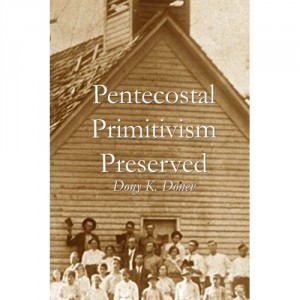
FURTHER READING:
Church of God (Cleveland, TN)
Azusa Street Revival of 1906
Prior to Azusa Street Revival of 1906
The Unforgotten: Historical and Theological Roots of Pentecostalism in Bulgaria
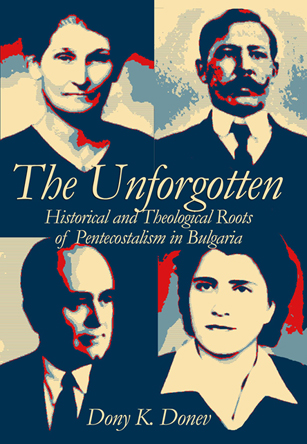
SEE MORE at Amazon.com by clicking this link
« Previous Page — Next Page »





















































